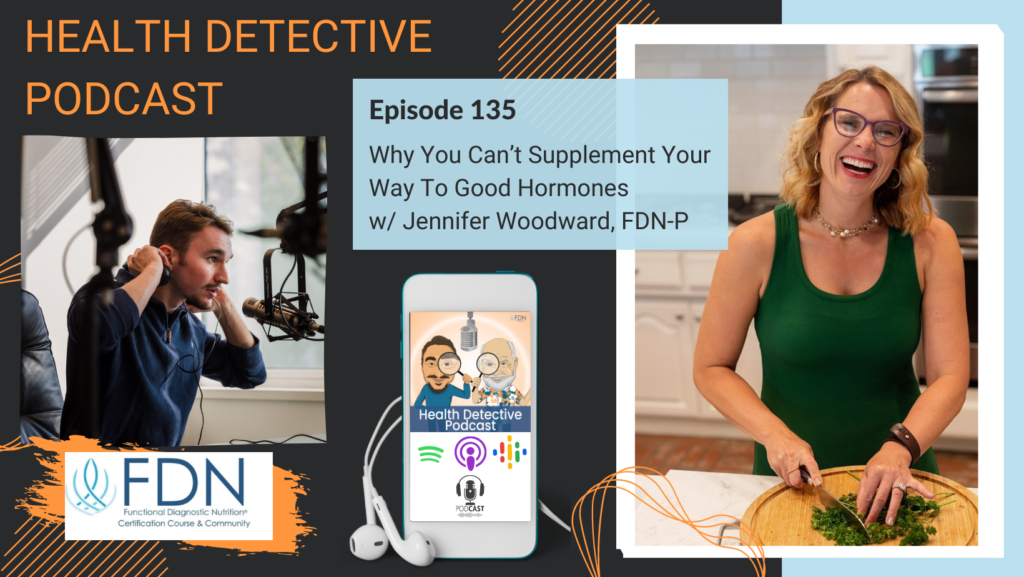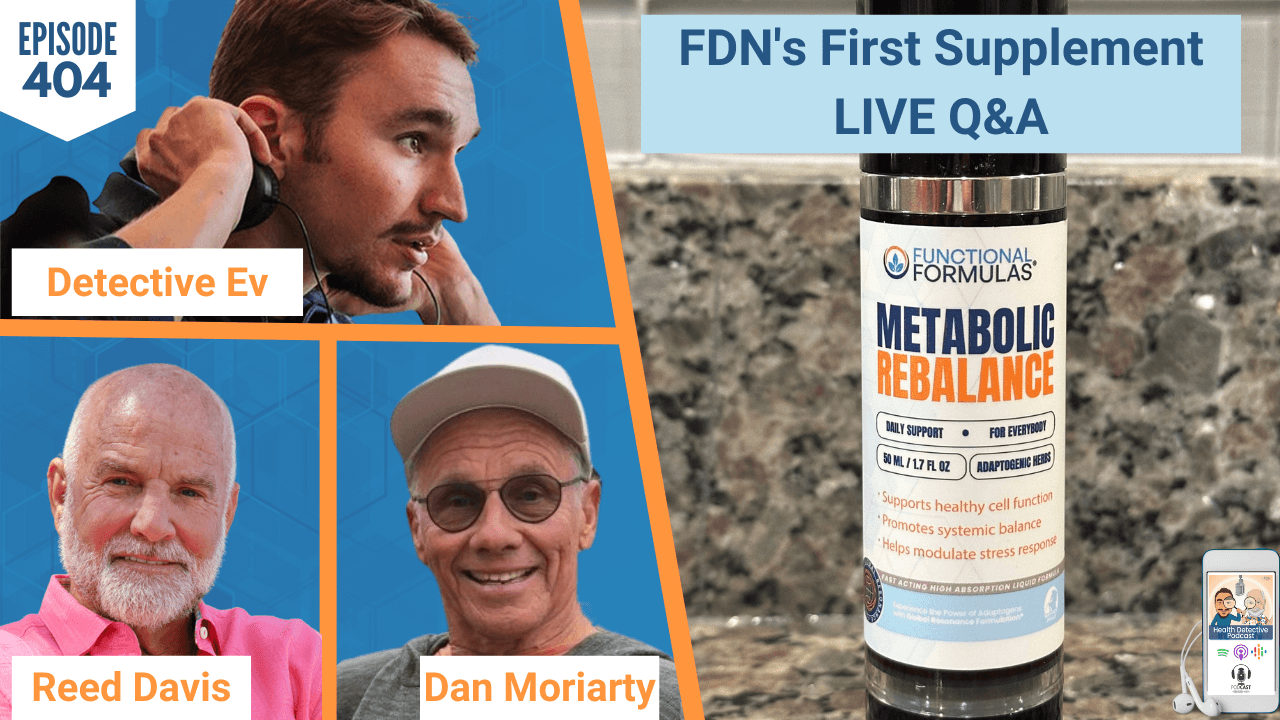Introduction
[00:00:00] Detective Ev: What is going on my friends? Welcome back to another episode of the Health Detective Podcast by Functional Diagnostic Nutrition. My name is Evan Transue, AKA Detective Ev. I will be your host for today’s show in which we will discuss why you can’t supplement your way to good hormones.
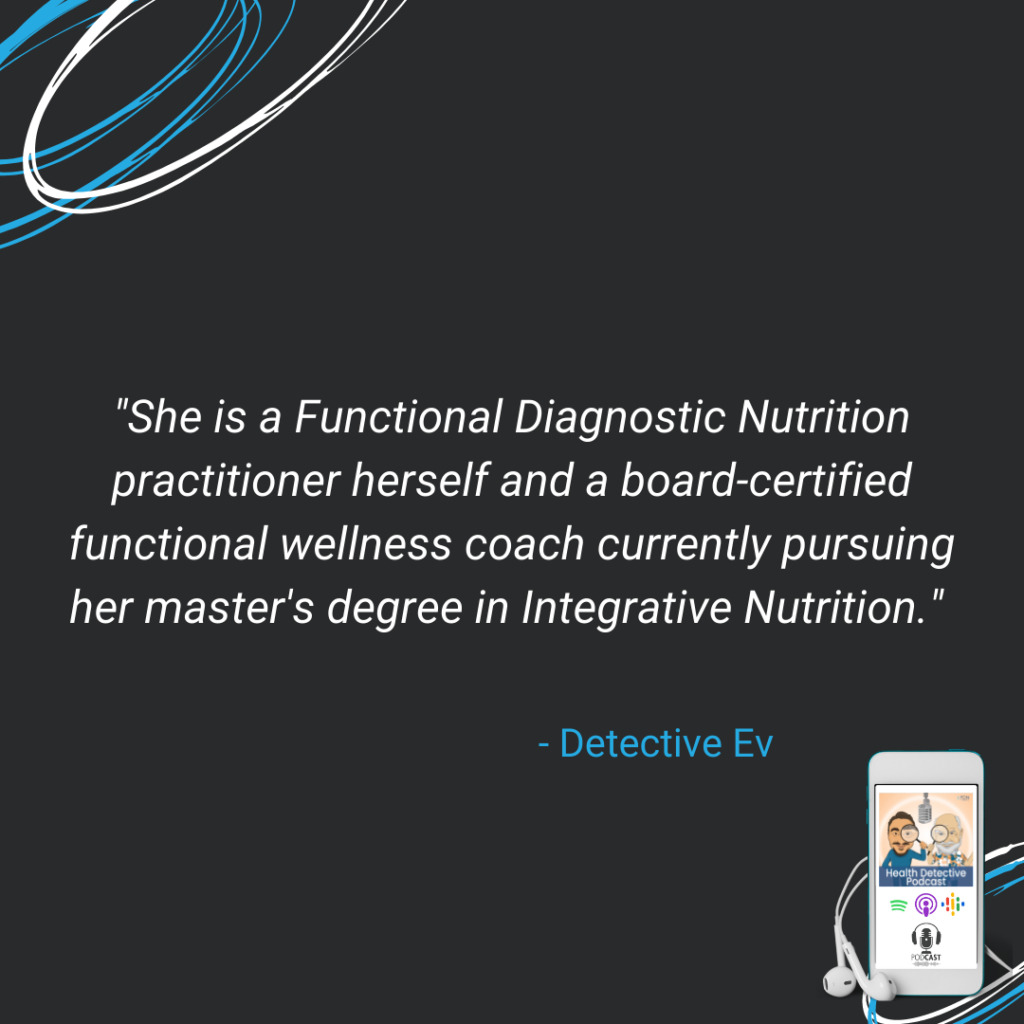
We have special guest and repeat guest, Ms. Jennifer Woodward. She is a Functional Diagnostic Nutrition practitioner herself and a board-certified functional wellness coach currently pursuing her master’s degree in Integrative Nutrition.
She is also someone wearing a very important hat here at FDN. She’s the Executive Director of AFDNP, which is the Association of Functional Diagnostic Nutrition Practitioners. She loves getting to help new FDNs thrive professionally. That’s our program where once you graduate, it’s an optional thing that people can join.
Not only do we provide extensive health training, additional mentorship, ongoing support, if you’re someone out there doing this work, but now we focus just as much on the business side of things and helping people thrive in their careers doing this as much as we do with the advanced health training.
For example, let’s say today I was in AFNDP, and I have a question about a really tricky client. Maybe something came back on the labs that I didn’t feel like I understood from the course, or it was just something that was a total curve ball. I can go into that AFDNP group, I can ask a question, I can have someone answer this for me in a matter of hours, usually it’s even quicker than that if it’s Monday through Friday. I’ll say hours just to be under promising and over-delivering. You’re going to get one of our mentors that’s going to answer that question and help you out.
A Little About Jennifer Woodward
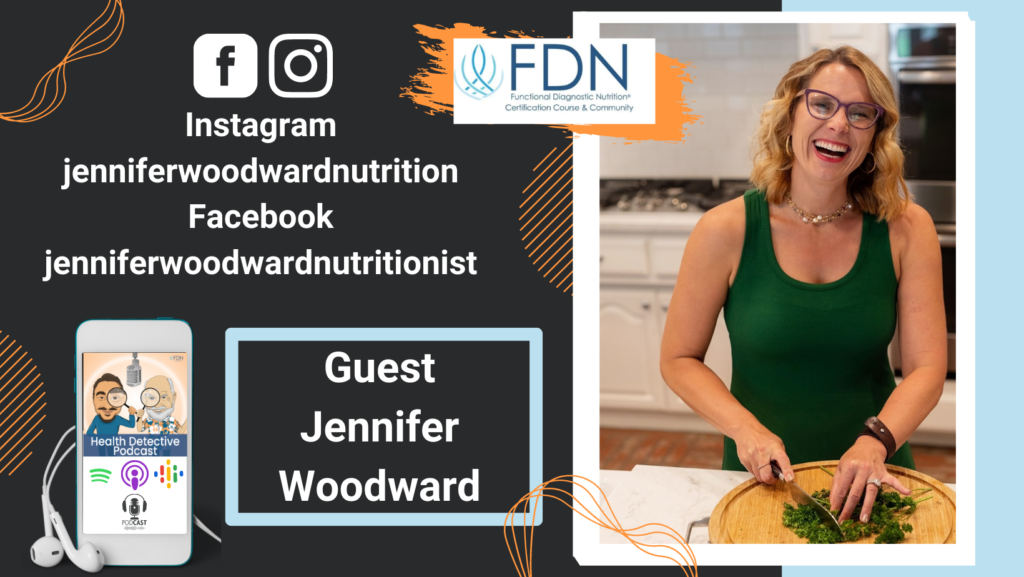
I could ask that question about something very technical health wise, but if the next day I have a question about this is my first year in business and I’ve never had to do taxes in this way. Could someone maybe help me out with that? You are also going to get someone that can guide you in the right direction with a question such as that. Or maybe I’m ready to hire my first assistant. What do you guys recommend? Also, something that can be helped within that group.
AFDNP is a huge part of FDN and the FDN community. Being the director of that is no small feat. That’s pretty impressive to get that role. They’re not just going to hand that out. Jennifer is that person and she’s been there for a couple years. She is doing an amazing job and has really repurposed the entire thing and rebuilt it and created a higher level of membership than ever before. I think people are really impressed with what she’s doing.
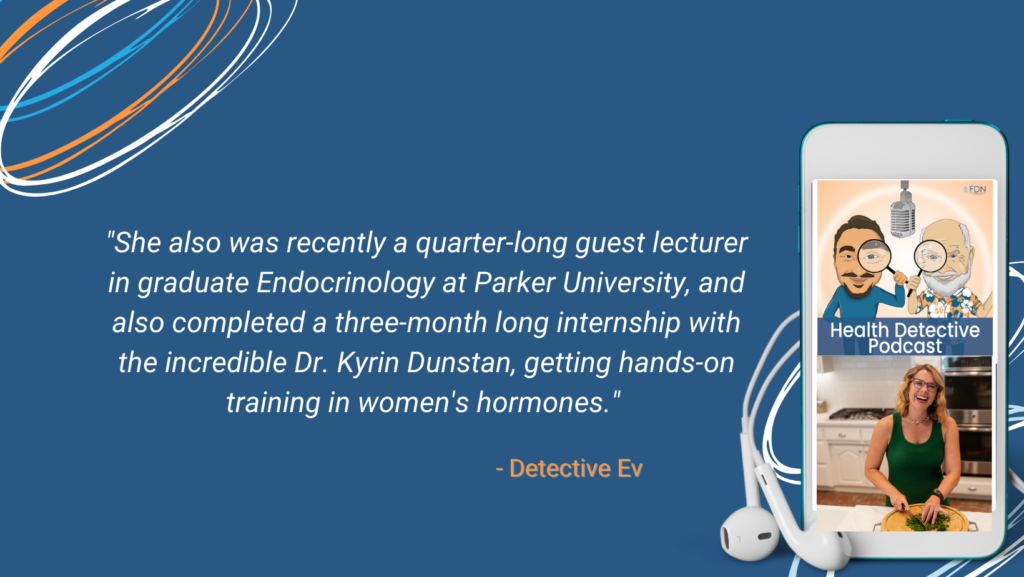
So, continuing her bio, she also was recently a quarter-long guest lecturer in graduate Endocrinology at Parker University, and also completed a three-month long internship with the incredible Dr. Kyrin Dunstan, getting hands-on training in women’s hormones. She loves to be active with her four kids and play Ultimate Frisbee with her squad. So that’s what she does when she’s not doing all things, nerdy FDN and functional medicine.
Today we’re going to be focusing more on hormones, supplementation that we can use when we’re experiencing burnout, all those types of fun things. Without further ado, let us get to the episode with Jennifer Woodward.
How to Submit Questions
All right, Jennifer Woodward. Welcome back yet again to the Health Detective Podcast.
[00:03:28] Jennifer Woodward: Thanks for having me, Ev. It’s great to see you.
[00:03:30] Detective Ev: All right guys, we’re trying out this new platform. We got video, everything’s going well. Then we learned that there is a consequence to using incognito browsers and that people have to upload afterwards. A lot of big stuff.
This happened with someone else, so don’t worry. I didn’t realize it on my end that this was going on so it’s all good. But because of this, if you’re listening afterwards, just know there’s gonna be some slight discrepancies in the audio, just at one part. It’s not going to be a big deal at all.
But basically, one of the reasons we wanted to have Jennifer Woodward back today, as you guys heard in the bio, she’s a huge person that FDN. Helps out a lot, has her own successful practice and really knows her stuff.

But I got a question from one of our listeners. And if you guys want to submit questions, all you ever have to do is type in the Health Detective Podcast on Podbean. You can actually leave us a comment there. I read every single one. We will answer them in one way or another. It might be just like an audience Q&A with myself. It might be a solo episode. But if I think it’s a solid question that a lot of the audience could benefit from, that is when we bring an expert on.
So, in this case, the reason I wanted Jennifer Woodward back on is not only because, what was your episode before? Did we establish that last time?
Question About Tanked Hormones from the Audience
[00:04:35] Jennifer Woodward: I think it was seven, number seven, right?
[00:04:37] Detective Ev: That would sound about right.
Ooh, you nailed it. Number seven, it’s Women’s Hormones and Healthy Periods with Jennifer Woodward.
No joke, I literally should’ve known that because I just sent that out in the last 24 hours to someone. I’ll keep it private, but it was someone that I know kind of in that thing with using a form of birth control, not experiencing a period anymore, and not really realizing that that’s kinda scary. You know, we don’t really want that. I don’t want their health to suffer from that. So, I’m like, hey, just check this out. They’re very open-minded, very cool, and intelligent person. So hopefully that helps them.
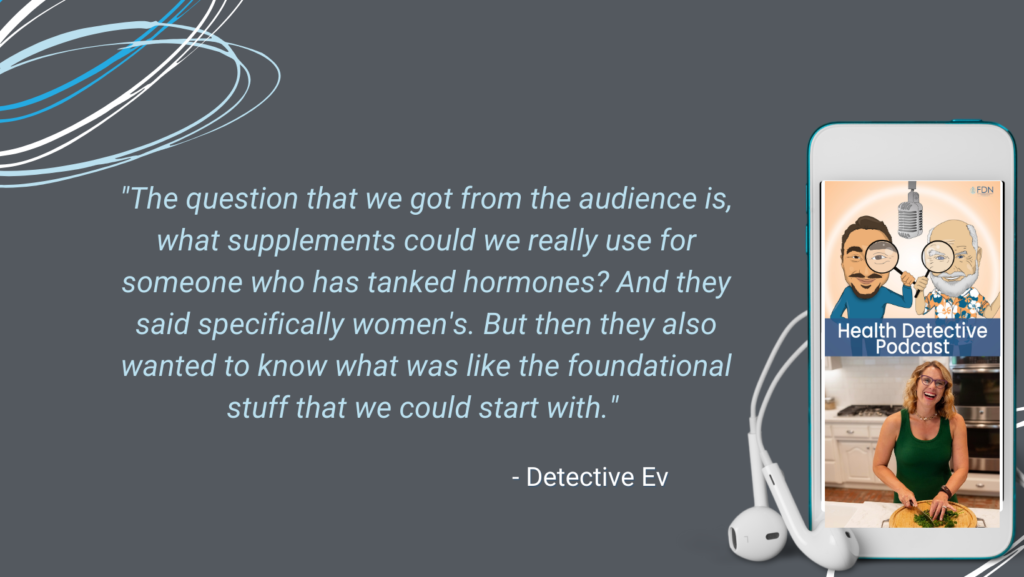
But beside the point, the question that we got from the audience is, what supplements could we really use for someone who has tanked hormones? And they said specifically women’s. But then they also wanted to know what was like the foundational stuff that we could start with.
So, in our second part of the recording, (thankfully, we have the bulk of this), we did talk about the supplement part and all that stuff. I know last time, Jennifer, we were kind of talking about HPA axis dysfunction, why people even have these tanked hormones, and again, where to start.
I’ll let you lead, and we’ll play with it from where it goes from there. What do we need to know first, before we start talking about supplementation or anything? I think there’s a few things we need to establish when it comes to tanked hormones.
Addressing Foundational Things for Good Hormones
[00:05:46] Jennifer Woodward: Yeah, totally. And this is what I tell my clients. Like supplements are sexy. You know, you can go on Amazon, and you can buy $40 worth of like hawked supplements. You can go on Instagram, right? You can take a pill.
But what we do at FDN and what we do in functional nutrition is not what the allopathic medical model is doing, which is a pill for every ill. And we, practitioners can kind of get trapped in that where like, oh, you have insomnia, you know, take this B6. Oh, you have tanked hormones, here, take this cortisol replacement. And we’re doing the same thing that traditional medicine is doing, if we’re not addressing everything else.
So, supplements are fine, but you guys, who are on here today, you’ve heard us talk about the D.R.E.S.S. protocol – diet, rest, exercise, stress management, proper supplementation. And guess what? Supplementation is my pinkie. All right. It’s like the low end of the totem pole. I always tell my clients rest and stress management, that is what we’re really, really focusing on.

So, 40% of your healing program is going to be rest and stress management. And of course, we’re going to get to supplementation because there are supplements that you can take to pull yourself out of hormone imbalance. But if you are not doing those foundational things, which is your D.R.E.S.S. protocol, then you are not going to be moving the needle.
What Great, Great, Great, Great, Grandma did for Good Hormones
Ev, I remember we were talking before we hopped on the first podcast about light and how that book you recommended, John Ott’s Health and Light, it really changed a lot for me. Thank you again for that resource. I loved it. I think about it all the time. And I know you do this with your clients.
I’m super passionate about getting my clients outside. If we’re looking at tanked hormones, we’re looking at things like cortisol, adrenaline, and noradrenaline. We’re looking at serotonin and melatonin. We’re looking at tryptophan metabolism. We’re looking at so many things in the body that are dependent on a circadian rhythm.
I often reference the mythical great, great, great, great grandmother. My clients are like, oh my gosh. Shut up about the great, great, great, great grandmother. But it’s a great visual. If you are thinking, and picture this if you’re listening to this right now. Close your eyes and picture your ancestors, right?
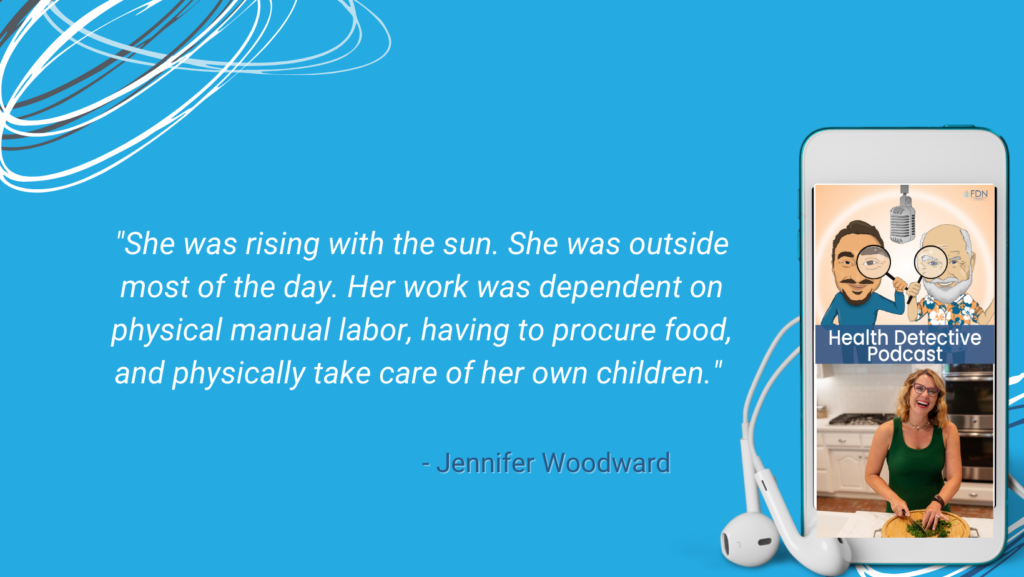
I’m not talking about like your ancestors from Italy or Croatia or across the pond, whatever, but even just three or four generations ago. What was your great, great, great, great grandmother doing? She was rising with the sun. She was outside most of the day. Her work was dependent on physical manual labor, having to procure food, and physically take care of her own children.
She came inside for a noonday meal because she was hungry. She wasn’t eating kale salads. She was working and so her body needed food and protein. Then she’s back outside again in the afternoon, probably doing things in community with other people around her. And then preparing a meal.
Our Ancestors with Good Hormones Did Life Much Differently
There’s no place to go when you live on a farm. You’re eating your meal at home; you’re cooking your meal at home. Then once the sun goes down, you’re going to bed. You’re retiring. If your great, great, great, great grandmother (and she was) was using a candle instead of fluorescent LED lighting, it was expensive to have to burn a bunch of candles.

So, it’s much easier to go to bed, have sex, fall asleep, wake up in the morning and you get to do the day again. She’s not suffering from a lot of the diseases that we are suffering from, these chronic, diet related illnesses that so many of us are really struggling with.
That’s the main picture we’re looking at – that holistic kind of D.R.E.S.S. protocol – being outside, being physically active, but not overly so, having community, making, preparing your own foods, that cephalic phase of digestion – digestion beginning in the head is extraordinarily important, especially for women who have hormone imbalance. Just living a simple lifestyle. That is what is going to pull your hormones out of the gutter. It’s not going to be five pills.
[00:09:30] Detective Ev: That’s a great intro. It’s a great way to start this off. I don’t ever know how to get it fully across because I talk about this all the time. I’m like, do you understand how different we are from our ancestors? Oh yeah. Yeah. We wouldn’t have been on artificial light at 9:00 PM.
Okay. All right. But do you get it? Because they don’t necessarily always change stuff. And I know our clients are a little different. They’re usually more responsive to this type of stuff.
Lifestyle Stuff Is Important for Good Hormones
It’s just so hard sometimes to truly get that paradigm and place it in their head so they realize, no, we can’t go that far away from nature and what we’re supposed to be doing. We’re guinea-pigging this. Like you said, even a few generations ago this was so substantially different. Now we’re seeing what’s happening when we go away from this.
What we get is 44% of kids, or whatever it is, at the age of 18 being on a pill for some kind of chronic disease. We’re seeing suicide rates go up in every single state from 1999 to 2016, except one. They say, oh, wow, went down by one. That’s good. Well, it was Nevada by 1%. So, I don’t think it’s that good. Everything else was terrible. North Dakota was the highest at 57% increase. There’s serious stuff going on.
This isn’t a joke. We really need to realize that there’s a lot of stuff that we’re doing wrong. We’re not living like our ancestors, as Jennifer said, and it has consequences. Now what’s having more of a consequence for you? Is it the food, light, lack of exercise, whatever? I’m not sure. For everyone, it’s going to be a little different. We need to address all of those things.
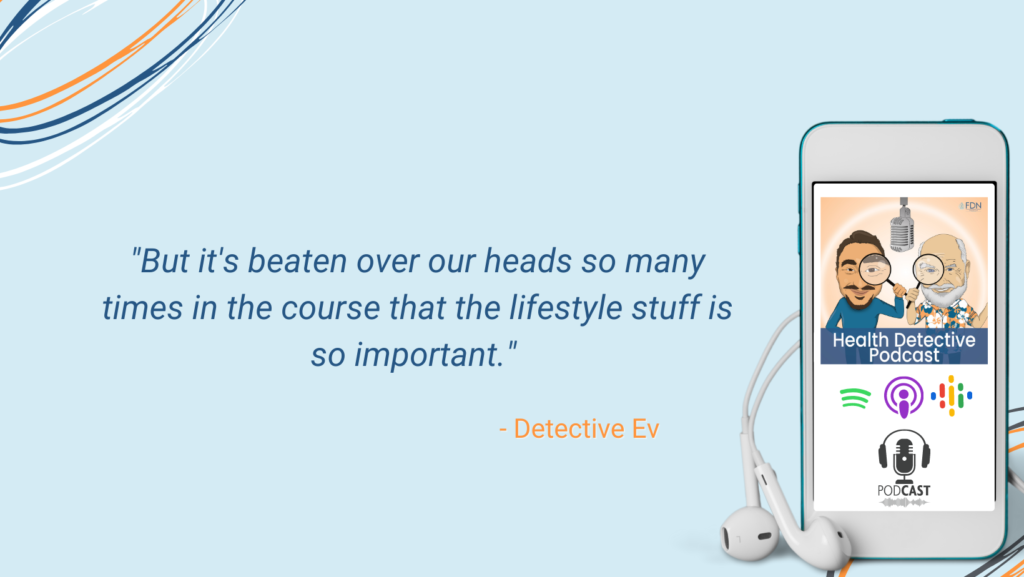
That’s one of the first things we’re taught as FDNs. It’s not the labs necessarily. I mean, we learn a lot about hormones. I get that. Literally, we learn about that first. But it’s beaten over our heads so many times in the course that the lifestyle stuff is so important. You run all the fancy labs you want, you give all the supplements, that’s that. So, I think that’s a good foundation to answer this to begin with before we get into the supplements.
Acute Phase of HPA Axis Dysfunction
Then the other thing we did explain on the first one that’s really worth mentioning here are these different phases of HPA axis dysfunction. Because when someone’s talking about tanked hormones, this person that asked (I’m not sure if they realize this, maybe they do, maybe they don’t), but we are talking about HPA axis dysfunction. People will still to this day reference things like adrenal fatigue, but it’s not so much that your adrenals are fatigued.
It’s that we have these axes, like the hypothalamic, pituitary, adrenal axis, or I know you were rattling them off last time. Like the hypothalamic, pituitary, thyroid axis. I think there’s even a gonadal thing and there’s one with ovaries as well. So, these are really, really integrated into us, guys, and it’s super important. I’ll start it off and then maybe you can kind of finish with the last two phases.
This is why Western medicine misses this a lot. If you were looking at a chart, you have normal hormone levels. You have your reference ranges, great. You’re nice and normal and you feel good, so you probably never even got them checked to begin with.

But then there’s that acute phase. Now they’re super high. Your cortisol is high at the very least. And you have that wired and tired type of thing. Like you’re pushing through, you’re getting four hours of sleep, but you are making it. For a lot of people, this is like their college days. They can still survive. I didn’t even make it that far. I was just a sicker kid. I mean, I would have never survived college. It would have been terrible for me.
Compensatory Phase of HPA Axis Dysfunction
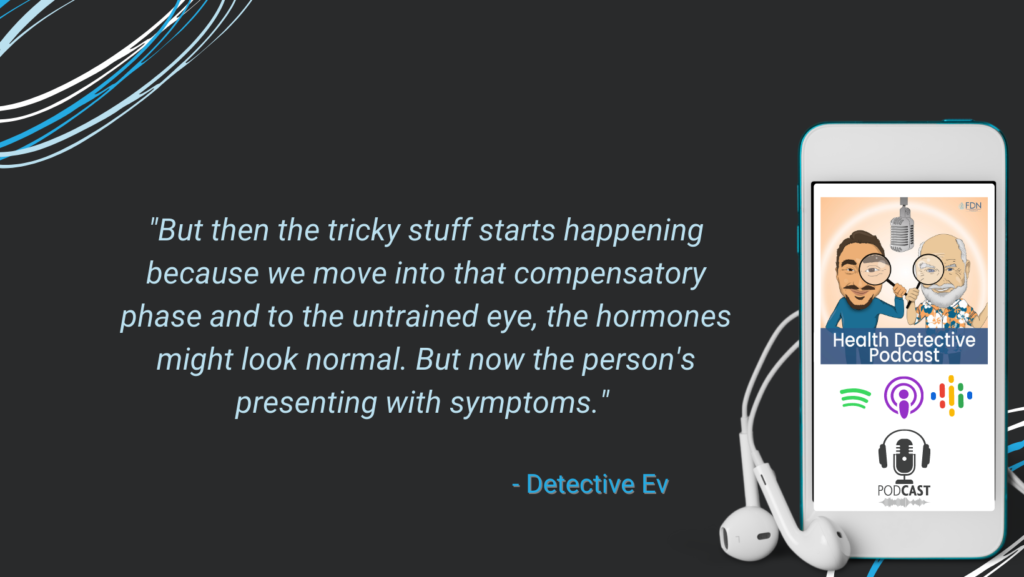
But then the tricky stuff starts happening because we move into that compensatory phase and to the untrained eye, the hormones might look normal. But now the person’s presenting with symptoms. They come back to us, and they say, well, everything looks normal here.
Again, I promised I’d let you do the last two phases. What is going on in that compensatory phase that to the untrained eye, even sometimes MDs are looking at these people, well, the lab works all normal, but they feel like crap. So why is that happening? What does that mean? That Compensatory Phase?
[00:12:48] Jennifer Woodward: Yeah, I love that.
You can see that on a salivary panel from looking at the Fluids IQ, hormone test or something. You can graphically see what cortisol levels look like. Cortisol levels, being your body’s kind of backup chronic stress hormone secreted from the adrenal glands. It’s very sensitive, very sensitive to stress signals from the brain, the hypothalamus and the pituitary.
That’s just the Genesis, the beginning, of all of these endocrine functions in the body. So, before your thyroid functions, before your ovaries function, before your digestion functions, your brain has to receive and interpret the signals from your environment and also from the inside of your body and delegate appropriately. It has to tell the rest of the body what to do.
These things do not work in isolation. It’s all coming from your body’s master computer, the brain. Of course, we have our higher functioning brain, but we also have a lizard brain. We have that subconscious primal brain, that is regulating your sympathetic and your parasympathetic nervous system.
A Failed Social Experiment That Ruins Good Hormones
Now sympathetic, like Ev was saying, it’s kind of like your fight or flight. This is where I’ve actually had clients tell me I want to run away and join the circus. No joke, not joking. They wanted to run away from their lives, their kids, their job, blah, blah, blah. As I tell my women all the time, and Ev kind of alluded to this. You guys, we are in the middle of this brand-new social experiment that has never happened before in human history.
We have people working three jobs. We have women outside the house having to provide for their families really for the first time in human history. We have social media. We have cars that go fast and lights that stay on all night. Of course, these things have been building to a crescendo, but truly it’s women and our younger generation that are taking the brunt of this experiment.
Can we push harder? Can we do more? Can we stay awake longer? And I’m telling you, no. It’s not working. It’s a failed social experiment. We are seeing that really with our clients and with ourselves, Ev, myself, everyone we work with. It’s a failed social experiment.

So, all that to say those are the things that are causing your brain to interpret all of these stress signals constantly. That pushes up your cortisol levels from baseline. If you take an exam as a kid, or if you have a fight with your best friend, or if you get stung by a bee, you’re 8, 9 years old, your cortisol levels are going to rise appropriately and that’s to help you deal with that situation. You got to fight, or you got to fly away. But you have to be enhanced.
Where Are the Resources for Good Hormones?
If that happens time and time and time and time again, and then you get older. On top of that, you’ve got bills, and you’ve got family, and you’ve got relationships, and you’ve got a job, and you’re stressed all the time, your body eventually runs out of resources. I see this and you see this, Ev.
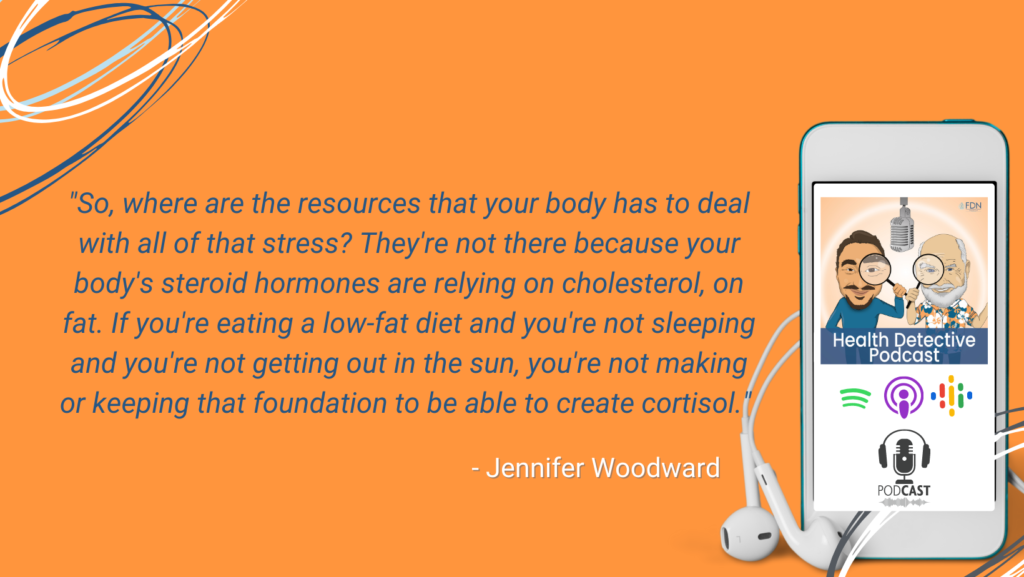
Now we’re eating a lot of fast food or you’re dieting on iceberg lettuce salads. You’re overexercising, you’re under sleeping. So where are the resources that your body has to deal with all of that stress? They’re not there because your body’s steroid hormones are relying on cholesterol, on fat. If you’re eating a low-fat diet and you’re not sleeping and you’re not getting out in the sun, you’re not making or keeping that foundation to be able to create cortisol.
That said, when all of that happens and your body’s pushing out cortisol all the time, all the time, it eventually can’t make it back down to baseline. So, it really surpasses that baseline level where you feel good and you start to dip down into what Ev referenced as the compensatory phase, where your body’s trying to compensate. It just can’t do it after a while.
I tell my clients, it’s like pushing down on the gas pedal of a car when you’re out of gas in the tank, it just it’s impossible. As Ev said, to an untrained eye, it looks like, oh, your cortisol levels are kind of normal, maybe a little bit low, but kind of normal. However, we know as practitioners that those cortisol levels cannot dip low unless they’ve already been elevated. That happens for so many of us.
Exhaustion Phase of HPA Axis Dysfunction
Like Ev said, junior high, high school, college, your first couple of jobs, staying up late, partying, eating crappy food in the cafeteria, or working a couple of different jobs. Maybe you weren’t going to college, but you were working your butt off and trying to make it in the world. Those things push us into the compensatory phase.
After that, this is where I usually see clients. When we slide down into HPA axis dysfunction – phase three – or the exhaustion phase. And Reed has a sense of humor, morbid sense of humor, because on our chart there’s a skull and crossbones that he teaches in the course.
[00:16:59] Detective Ev: One of the first things you see, it’s like, welcome to FDN.
[00:17:02] Jennifer Woodward: That’s real, right? And it is.
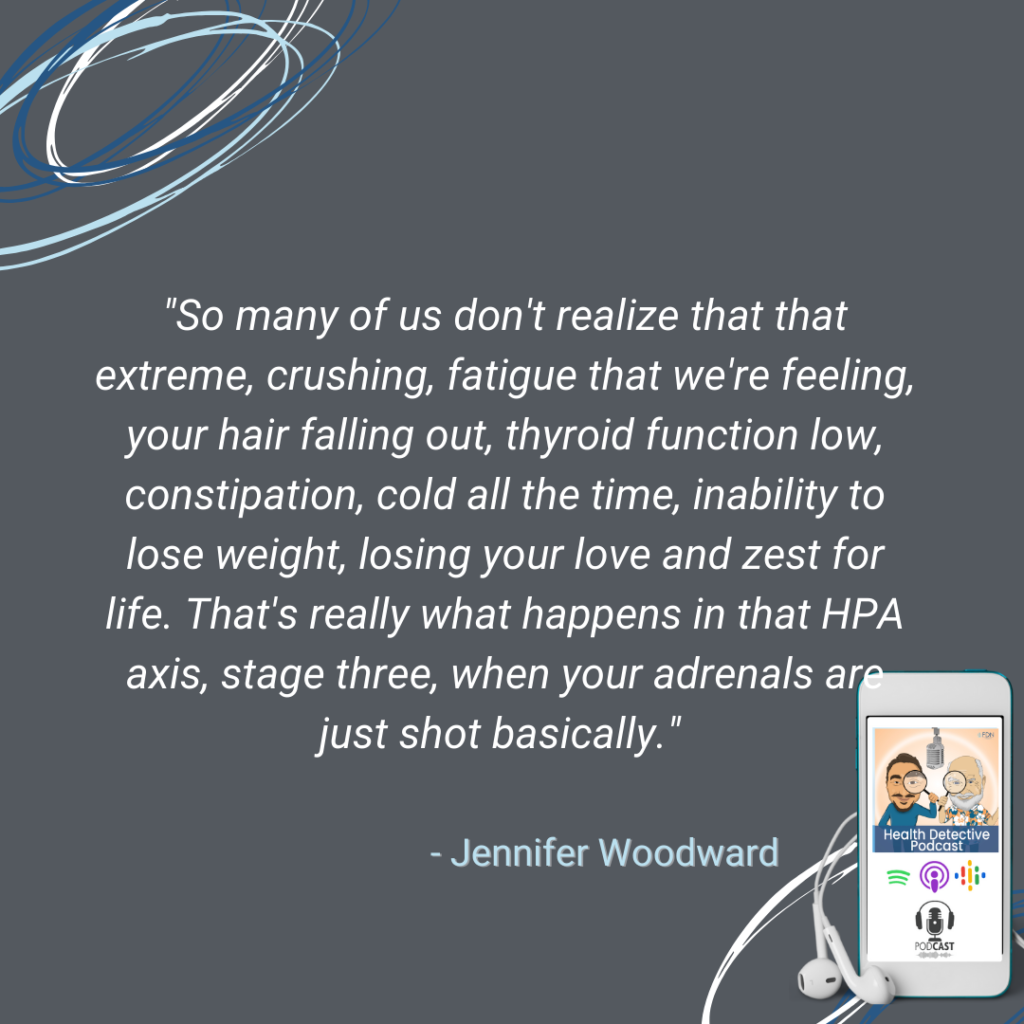
People feel that way when they’re in the exhaustive phase. I have been in the exhaustion phase of HP axis dysfunction. It’s awful. So many of us don’t realize that that extreme, crushing, fatigue that we’re feeling, your hair falling out, thyroid function low, constipation, cold all the time, inability to lose weight, losing your love and zest for life.
That’s really what happens in that HPA axis, stage three, when your adrenals are just shot basically.
Good Hormones & the Power of FDN
[00:17:31] Detective Ev: I think we have a very niche, profitable little market right there. “I survived phase three HPA axis dysfunction.” We could make a shirt out of it or some crap. I know some nerds that would buy that.
When I came to FDN, just a 21-year-old guy and I’m in the exhaustive phase of HPA axis dysfunction. I was just like, wow.
Now you had said this in your podcast, back in the day. You were actually really happy when you got your lab results, you’re in the car. It brought you to tears because this was validating in a sense. Oh, this is why I feel so bad. For me, it was kind of the same.
I was a little nervous. I’m not gonna lie. But at the same time, I was like, wait a second. Well, this test result was already true regardless. So, there’s no point to be nervous. This is validating. This is finally something telling me what’s going on so I can get better here. Then I retested my hormones. It was sometime in early summer of 2020.
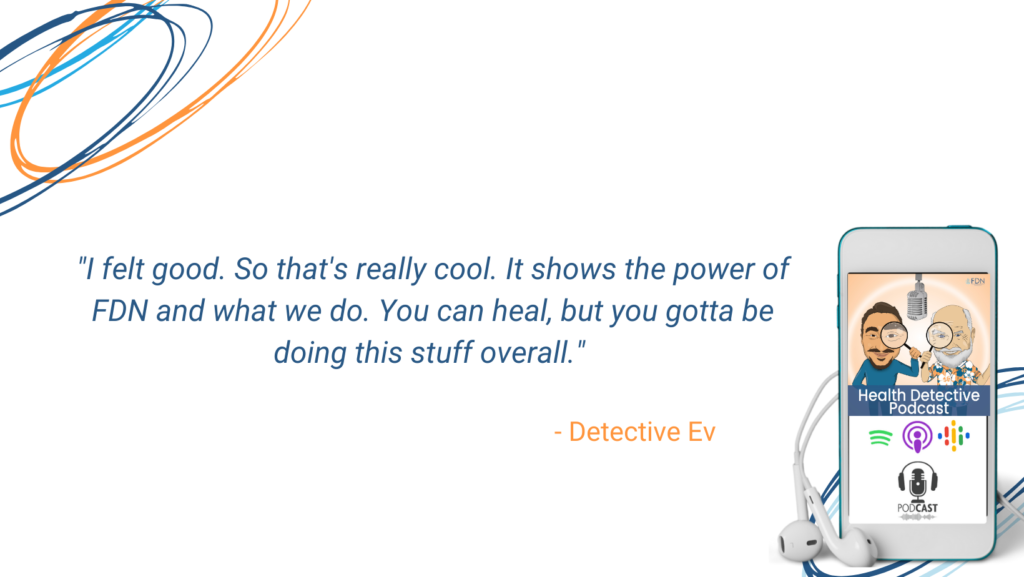
It’s kinda cool and sounds like maybe not great to some people, but for me it was good. It was very mildly in the acute phase actually. Like my morning cortisol was a little too high. But I looked at that as good, because this is someone who used to be in exhaustive. If my biggest problem now is like morning cortisol level too high, and everything else is perfect. I will take that. I felt good. So that’s really cool. It shows the power of FDN and what we do. You can heal, but you gotta be doing this stuff overall.
FDN Course Commercial Break – Try it for FREE
I feel like we actually gave a lot more in this first section now than we did before. Anything we missed?
[00:18:47] Jennifer Woodward: I mean, we answered the question and kind of talked about HPA axis dysfunction.
So if there is a gap, dear listener, we are sorry. I have to say it was my fault on my end, but we appreciate you being here.
[00:18:58] Detective Ev: Wonderful. Hey guys. It is Detective Ev here really quick. Just wanted to let you know if you haven’t heard, we are now letting people try the FDN course completely for free. No credit card required. Nothing like that. No debit card either. Right? That’d be a cute little trick. I say no credit card and then you got to put your debit card in.
All you gotta do is go to fdntraining.com/tryfdn. That is fdntraining.com/tryfdn. We always know that there’s different types of people who listen to this podcast.
Some of you are interested in finding someone to work with. That’s fantastic. Others just want to hear about health information and learn from that. That’s also cool. But there’s others out there trying to make a decision about what to do next in their life. And maybe they’re contemplating the FDN course. Well, this is the way that you can do this.
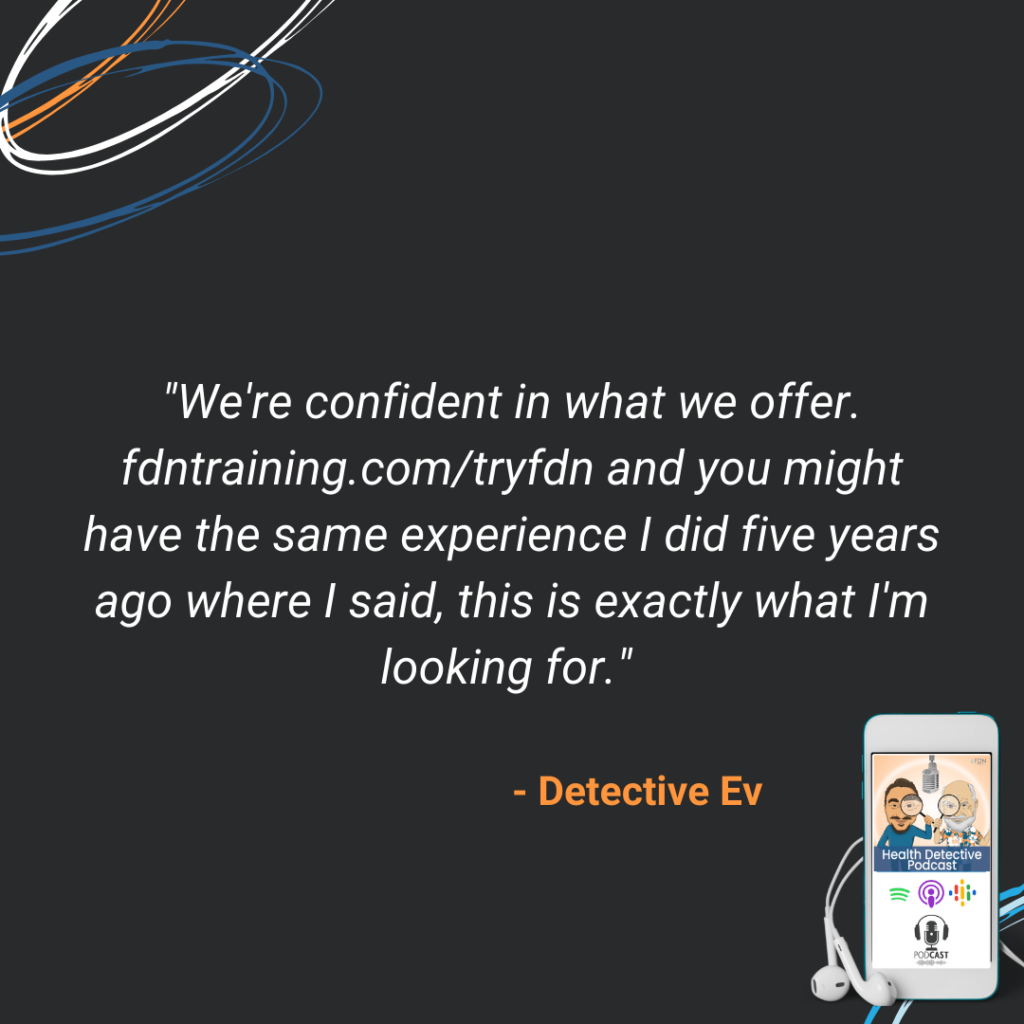
We know there’s people out there that need the course. We know it’s not for everyone. So, we make it really simple. We’re confident in what we offer. fdntraining.com/tryfdn and you might have the same experience I did five years ago where I said, this is exactly what I’m looking for. And now somehow, I’m doing the podcast. Funny how that works.
Okay. Back to the episode. Please continue to tell us about this HPA axis dysfunction.
Good Hormones Mixed with Bad Stress = Hormonal Imbalance
[00:20:09] Jennifer Woodward: Okay, awesome. We were just talking about the compensatory phase, where your body’s overwhelmed for an extended period of time.
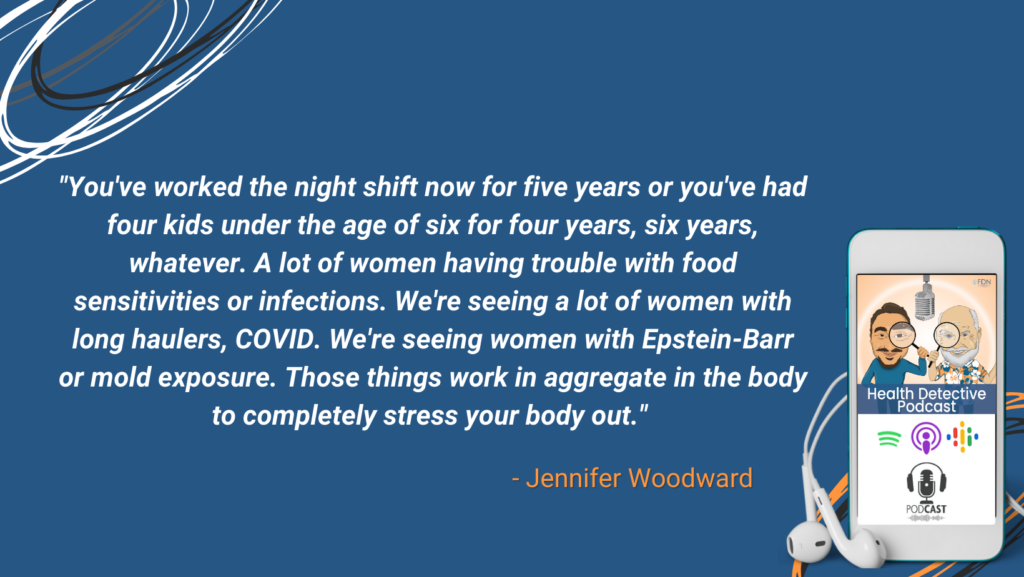
Like you were saying, Ev, on paper, if you’re just testing one time, a one-time snapshot of your stress hormones, like cortisol or adrenaline or something like that, you might look normal. But like you were saying, okay, you’ve worked the night shift now for five years or you’ve had four kids under the age of six for four years, six years, whatever.
A lot of women having trouble with food sensitivities or infections. We’re seeing a lot of women with long haulers, COVID. We’re seeing women with Epstein-Barr or mold exposure. Those things work in aggregate in the body to completely stress your body out.
So, I’ll see women who say my life’s not that stressful. I don’t feel stressed out. But if we look back and see, well you haven’t slept through the night in eight years and you are harboring these extremely high Epstein-Barr titers. You’ve got auto immune disease. These are all things that are going to push your cortisol levels first, really high.
Then as they compensate, they’re going to dip down really, really low. So kinda to answer that listener question, yes, there are supplements that you can use to kind of pull yourself out of HPA axis dysfunction. You guys might hear it as adrenal fatigue. You might feel it as feeling like crap, right? You don’t need a diagnosis for that. You just don’t feel good.
Let’s talk about some specific supplements. So if you’re trying to pull yourself out of just that flat line where you’re exhausted all the time, I do like a mix of herbal formulation.
Specific Supplements When Working for Good Hormones
I really do like ashwagandha. You know, that’s contraindicated if you do have active Hashimoto’s thyroiditis, because your immune system can respond to it unfavorably. But you can also use some adrenal cortex from Pure Encapsulations. There’s a great product I use with a lot of my clients called ADR, and that is straight adrenal cortex.
When your body’s suffering like a lot of our bodies are, and you can see it on something like a salivary cortisol panel where your cortisol levels are really low. You’re not producing the amount of cortisol that you need in order to make it through the day. You don’t have that get up and go that you’d necessarily need to feel good that day. The adrenal cortex is providing some of that adrenaline and also cortisol that your body is not producing on its own.

The only contraindication with the adrenal cortex, the ADR product, is that you can take it for a total of three months or less. Please do not take it for more than three months. You are going to feel better on it, but it’s just a band-aid that you’re using while you’re working on the rest of D.R.E.S.S. You’re getting in ketosis, you’re doing your rest, you’re getting your sun exposure, you’re taking more naps, you’re testing for things like food sensitivities.
You have three months to kind of figure out where some of those root cause imbalances lie, and then you’re going to have to wean yourself off that adrenal cortex.
At the same time I use that, I’ll use it in combination with a product called Adrenal Assist from Vitanica. So those are my top two products
if you’re just feeling depleted across the board.
HPA Axis Dysfunction vs. Adrenal Fatigue
[00:22:58] Detective Ev: I’m guessing that’s a blend of things, right? For that second product.
[00:23:00] Jennifer Woodward: Yeah. Yeah. The Adrenal Assist system. It does have some ashwagandha, some medicinal mushrooms, other adaptogenic herbs, and some B vitamins.
[00:23:10] Detective Ev: Okay. We have talked about this plenty of times before, where it’s like, it’s not really adrenal fatigue, that’s not really an appropriate term. It is HPA axis dysfunction. And even you said you might hear it as that, but you weren’t suggesting that’s correct.
But then if I’m an audience listener, I’m like, well, wait a second. She just recommended adrenal cortex. So why would that help even if that’s not the core problem?
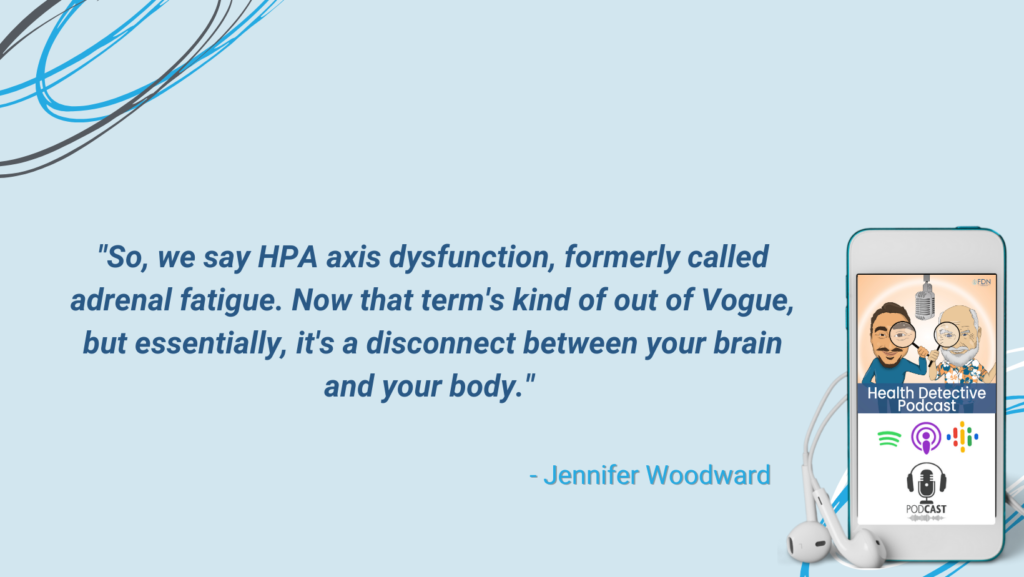
[00:23:27] Jennifer Woodward: Right. Right. Well, because it’s part of the axis still, right? So, we say HPA axis dysfunction, formerly called adrenal fatigue. Now that term’s kind of out of vogue, but essentially, it’s a disconnect between your brain and your body.
Your brain – your hypothalamus, and your pituitary – those two brain organs that are kind of inputting and interpreting all of those stresses that you’re experiencing on the inside and the outside of your body, they’re the ones that are telling the rest of your endocrine system, what to do.
I kind of love this too. You know, it’s not just HPA axis where we’re talking about the hypothalamus, the pituitary, and then the adrenal glands, which are the ones that are shock out of all like cortisol and adrenaline, in a situation like HPA axis dysfunction stage one, two, or three.
Addressing the Adrenals First When Working for Good Hormones

We also have the HPO axis. I deal with that a lot in my practice, hypothalamus, pituitary, ovaries. You have the HPT axis, hypothalamus, pituitary and thyroid. So, we are kind of like starting at step one where you’re addressing the adrenals as the preeminent part of that hypothalamus and pituitary system. But it also has further reaching implications to the rest of your endocrine system. The adrenals are just a good place to start if that makes sense.
[00:24:38] Detective Ev: Yeah, absolutely. I think, again, I can picture someone asking that, but that’s a perfect explanation. There are so many axes that the hypothalamic, pituitary, whatever, kind of fall under.
What I find so interesting, Jennifer and I are on opposite sides of the country, but it’s about to be nighttime here while we’re doing this podcast. And if you’re watching, I got my blue light blocking glasses on. People, even if they read the data on this, they still may be confused sometimes.
Well, when you hear something like this, we got people taking all these supplements, which I’m all for in the beginning. I think that makes sense. It does give you a quick boost. You know what I mean? Nothing else is going to fix you overnight. So, you might as well support this person while you can.
But what people don’t talk about is there is something really special in the hypothalamus called the SCN or the suprachiasmatic nucleus. That is your body’s internal clock, which is completely regulated by light. When you start using light properly and stop using bad light inappropriately, that stuff does work better. It is a whole holistic approach where yes, we can use some intelligent allopathy, which we don’t mention nearly enough here.
Supplements Alone Won’t Give You Good Hormones
Just to be clear what intelligent allopathy is. Allopathic medicine is a more of a conventional side of things where we treat things with drugs and surgery. Intelligent allopathy is kind of a play on words where we’re going to help this person not feel like crap. We’re not sadist. But we also need to be working on some stuff while you’re using those supplements.
Just like Jennifer said, this might make you feel good in a matter of days. I’m familiar with products like that. Depending on the person, that could make you feel better pretty quickly. It’s actually remarkable how fast it can do it, especially considering how tanked that person might be.
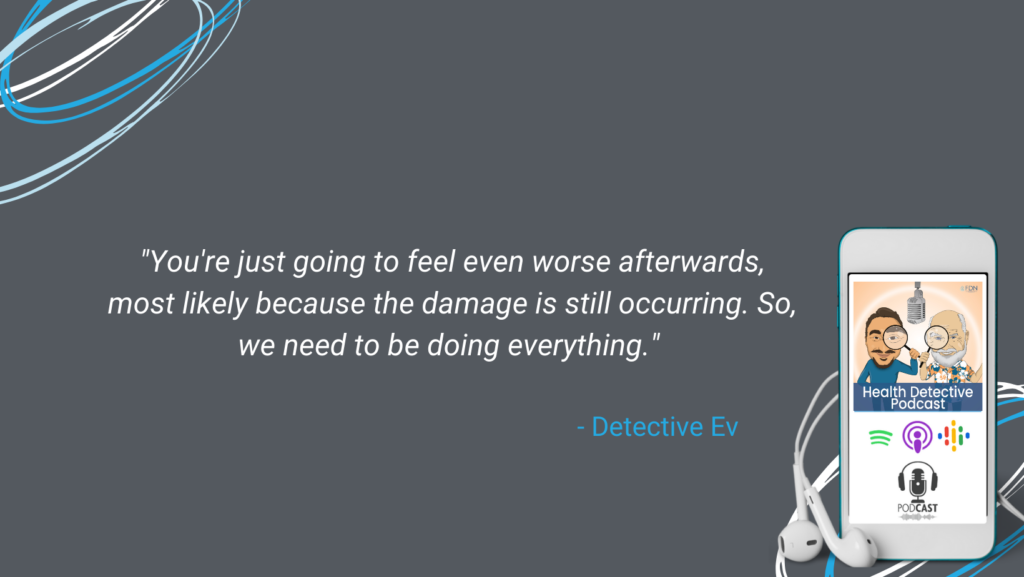
But if you don’t figure out what is actually leading to this and the habits in your life that need to be changed, you wasted three months. You’re just going to feel even worse afterwards, most likely because the damage is still occurring. So, we need to be doing everything. It is the food, the food sensitivities, the light, the gut pathogen. And it’s not to scare people, but there is so many things in our modern world that cause stress to the body.
It’s ironic, cause you’d think the tribal days when they had to worry about all the things that come with being in a tribe and in nature, you’d think that’d be more stressful. But it’s just there’s stuff that’s not inherently obvious. It’s not always the tiger in the woods, guys, or having to go on the hunt. It’s the fact that we’re surrounded by EMFs, the fact that we are eating such crappy food with chemicals that our ancestors just didn’t have, the fact that our circadian rhythm, everyone’s, is trashed to some degree.
Some Best Practices for Good Hormones
Me doing this right now, even with these glasses, I know that there is an effect from this hitting my skin and there’s melanopsin receptors in there. It’s dark, I’m not supposed to be doing that. Now I feel overall good, so I learned to balance it. But again, you don’t want to be scared of everything because that’s just more stress, right, Jennifer? You gotta be careful though.
We talked about possible supplements. I appreciate a direct recommendation with that. Then the question also involved best practices. Now, of course, you and I would very biasedly say FDN because it worked for us. That got my hormones out of the exhaustive phase to where I wanted them to be.
It certainly did the same thing for you. You guys got to go back to her episode, number seven on here, and listen to that. It’s really cool. But what are some best practices generally speaking, because we’ve kind of been elusive about what that is. We mentioned a few things, but let’s get straight forward.
What are some things that people can do, or they have to do if they really want to have a chance at getting their tanked hormones recovered?

[00:27:50] Jennifer Woodward: Yep. I will tell my clients, it’s super sexy to talk about diet. Everyone can pop a pill. That’s no sweat off of anybody’s back. But where the rubber hits the road for all of us who are in the first, second, third stage of our healing journey is making your lifestyle work for you instead of against you.
Get Outside for Good Hormones
And I know, Ev, you are a huge proponent of this. I have a hard time working with clients if they cannot devote to me, you know, 30 to 60 minutes a day, where all they’re doing is taking care of themselves, hopefully more than that.
I love reading Mark Sisson, The Primal Blueprint. I’m sure you’re familiar. I remember he sent out an email like two years ago and it was encouraging people, can you spend more time outside today than you do inside? Let that sink in for a minute everybody. How much time are you spending inside? And this is just wake time. This isn’t even like time in your bed, where all of us are inside.
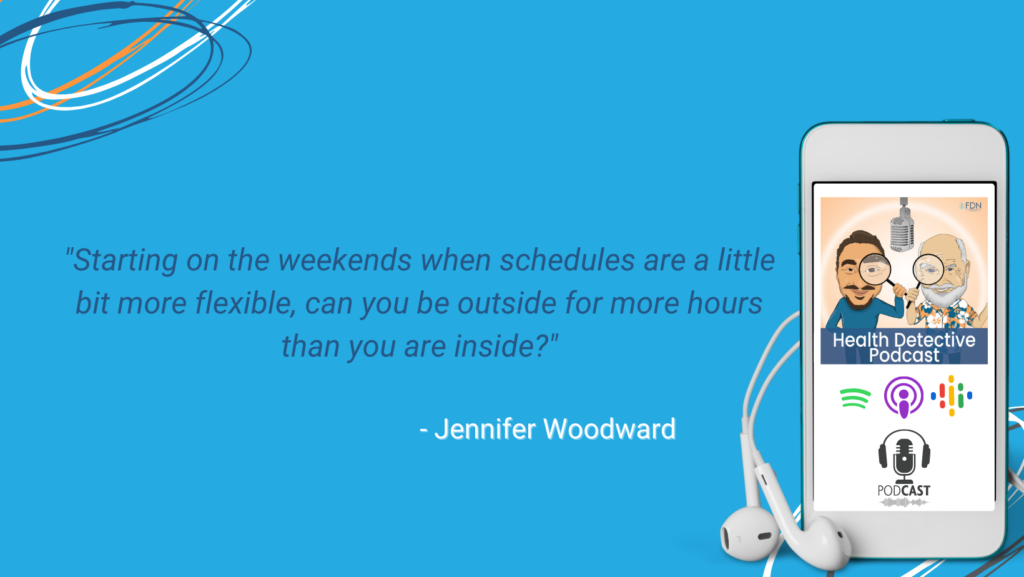
It’s throughout the day. How much time are you outside as opposed to inside? So that’s one of the first things I do with my clients too. Starting on the weekends when schedules are a little bit more flexible, can you be outside for more hours than you are inside? This is step number one to healing. The other very practical thing that you can do.
Number one is free, right? Like it costs no money and it’s easy to do, even if it’s cloudy outside, even if it’s snowing outside. We just got back from Tahoe. We were outside skiing for three days straight. We slept fantastic. We’re outside for five hours a day in the sun doing physical activity.
Leisure Time for Good Hormones
It’s such a disconnect from what most of us do every single day in the United States where our butts are in a chair, we’ve got fake light, and we’re not moving. No wonder our bodies don’t feel good. The other thing I really encourage my clients to do is find whatever it is that you did before you had to “adult” that made you feel good.
What did you like to do as a child, Ev? What was the thing that would just like transport you when you were 8 or 10 years old?
[00:29:38] Detective Ev: That’s a good question. I was an eccentric little child, as well as an eccentric adult. I loved biking and stuff. That was one of my favorite things ever. You know, I could bike for miles. I didn’t have a bike that was equipped to do that, but I could go do it.
[00:29:49] Jennifer Woodward: That’s for sure. Love it.
Many people will say something like that. I love to roller skate. I love to blow bubbles from like my bubble wand. I love to read books. Whatever it was, these things we generally stop doing when we start adulting cause we think we have to.

But it destroys us. It destroys our soul; it destroys our body. That’s one thing I’m very passionate about with my clients is we’re finding something that is your hobby. We call it leisure time. And you’re going to promise me that you devote at least 30 minutes a day to leisure time.
Breath Work for Good Hormones
I’ve had women pick up the piano again or start playing the ukulele or just find something that they love to do. Hiking, collecting butterflies, I don’t know. But it’s something that pulls you away from the day-to-day where you’re just constantly in that fight or flight mode.
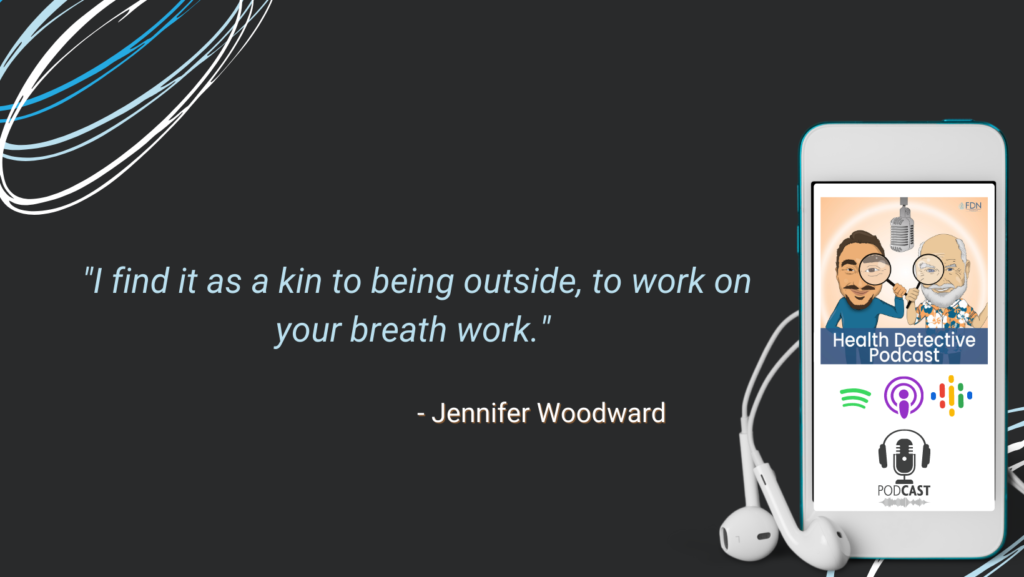
That’s another free thing that you can do unless you want to do like expensive watercolor classes, I don’t know. You can find something that’s free that just feeds you. The third thing that I work on with my clients is, again, completely free thing is breathing. Oh, my goodness. I find it as a kin to being outside, to work on your breath work.
We’ve got too much carbon dioxide. We’ve got not enough oxygen. We forget how to breathe. And we’re constantly panicked, right? That book Breath by James Nestor, Ev,, I am sure you’ve read it. It’s a fantastic resource.
[00:31:04] Detective Ev: I have not read it, but I got it.
Jennifer Woodward: Okay.
Detective Ev: Oh yes. I can’t believe I did it with this book. It’s a book that sits on the shelf. It hasn’t been read. Come on Ev! I’ll put that right here.
One Minute of Deep Breathing for Good Hormones and Good Digestion
[00:31:12] Jennifer Woodward: You’ll get there. We talked about it in book club. It’s just fascinating even if you are to read it for the first couple of chapters where James Nestor and his weird friend from like Russia or something, plug their noses and breathe out of their mouth for 10 days straight. They start to get hypertension. They start to get depressed. They start sleeping like crap. They start developing food sensitivities. So, this is another thing. It’s insane.
What happens is we become this nation of mouth breathers because our dental pallets are not as formed as they should be. We give our kids binkies. We are only eating soft foods. We don’t chew anymore. Our facial structures aren’t necessarily that of our ancestors and consequently, we’re not sleeping as well. We are depriving ourselves of oxygen. It’s a cool book. It’s a great resource. You can really get into that.

But essentially, I have my clients download a free app called Breathwrk, breadth wrk. There are one minute breathing activities that I have my clients do before they eat any meal. So, just one minute of deep breathing before they eat puts them into parasympathetic mode out of that fight or flight into rest and digest. We can do a lot of good work if you are in parasympathetic mode for most of the day, especially before eating.
There’s a third tip I have for you that’s completely free, that will get you out of that tanked adrenal situation and start rebuilding your hormones.
We Weren’t Meant to be Sick
[00:32:32] Detective Ev: That’s so cool. I love that you mentioned the thing of free because if people really think about it, the best stuff has to be free. Why? Because we weren’t meant to be sick.
Seriously though, what currency did our ancestors have to go buy some expensive therapy? They didn’t. It was just an inherent part of being human to be resilient. It’s amazing. I can say it, but I can’t comprehend it.
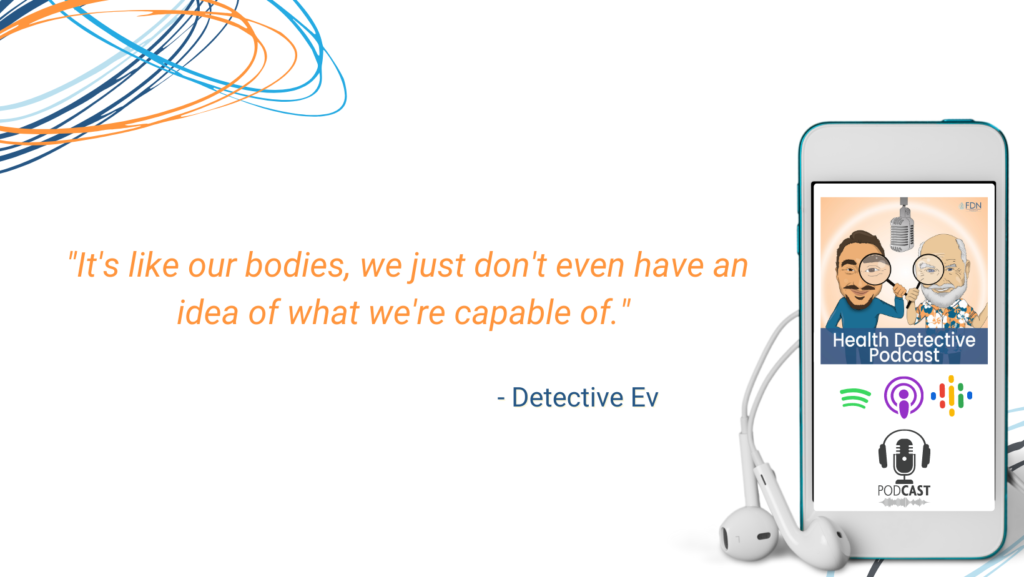
The idea that there were people that did live to a hundred or 90-whatever, 200, 300, a thousand years ago. We do have that documented where that happened. Think about what you would have needed to survive through during those times to get there. It’s like our bodies, we just don’t even have an idea of what we’re capable of.
Honestly, that alone was very encouraging for me to read the book. I appreciate that because, I’m always reading something, but I get caught up with something else. I’m on a spiritual kick right now. And it’s like even five pages of some of these books. It takes no time at all.
Like you said, even if you just get through the first few chapters of this, you can really get a lot out of it. And there could be a secret in one of these books that’s just waiting for you. But what I’m getting at is the fact that if that alone, like the mouth breathing thing, cause I know that’s been big for me.
I had a history of like chronic sinusitis and I realized that I still have a habit of the mouth breathing, especially when I’m sleeping. It’s so annoying. I’ve not tried the mouth taping thing yet. Have you?
[00:33:44] Jennifer Woodward: Okay, hold on.
Taping the Mouth Shut for Good Hormones and Good Sleep
[00:33:46] Detective Ev: Oh boy. Oh boy.
[00:33:48] Jennifer Woodward: Where’s my mouth tape? I send it to all my clients.
[00:33:51] Detective Ev: She didn’t even have to get up out of her chair to get it.
[00:33:53] Jennifer Woodward: It’s right here.
Everybody gets it in their welcome package. Taping the mouth shut.
[00:33:58] Detective Ev: Wow. Okay. And you’ve enjoyed this?
[00:34:01] Jennifer Woodward: I love it. I have a wide dental pallet already. Like I’ve never had braces. My head’s just larger. My parents had good nutrition. But I feel like I’ve been able to train myself to keep my mouth shut while I’m sleeping, even without the mouth tape.

Now that I’ve been doing it for like six months and I am breathing deeper. I don’t wake up. I don’t have to drink water at night anymore. I don’t even have to get up to pee anymore. Cause my sleep’s so deep that my body stops that need for having to get up and pee. I think it’s amazing and that’s $7 for 120 strips on Amazon.
Detective Ev: What brand? Does it matter?
Jennifer Woodward: It’s like some off-brand.
[00:34:35] Detective Ev: I didn’t know, because I know Scotch tape, a lot of those adhesives apparently have like traces of gluten in them. So, I didn’t know if there was a specific brand for that. I feel like one of these hippies in this space would have come up with something by now.
[00:34:44] Jennifer Woodward: That’s a great point, actually. You can probably do your research there. You can just buy, I think, a medical tape on Amazon that I’m sure is vetted at least, you know?
Staying Close to the Simple, Natural Things for Good Hormones
[00:34:53] Detective Ev: Cool. So that’s my point. Like, let’s say this, right?
We have this stuff apparently. And I believe them, fine. They can get food sensitivities from doing something seemingly as simple as mouth breathing and the hypertension, the depression, whatever. That’s one thing, it’s one thing that’s so simple.
Then we talk about the sunlight stuff. Then we talk about the food stuff. To me, it’s actually amazing that we’re not sicker.
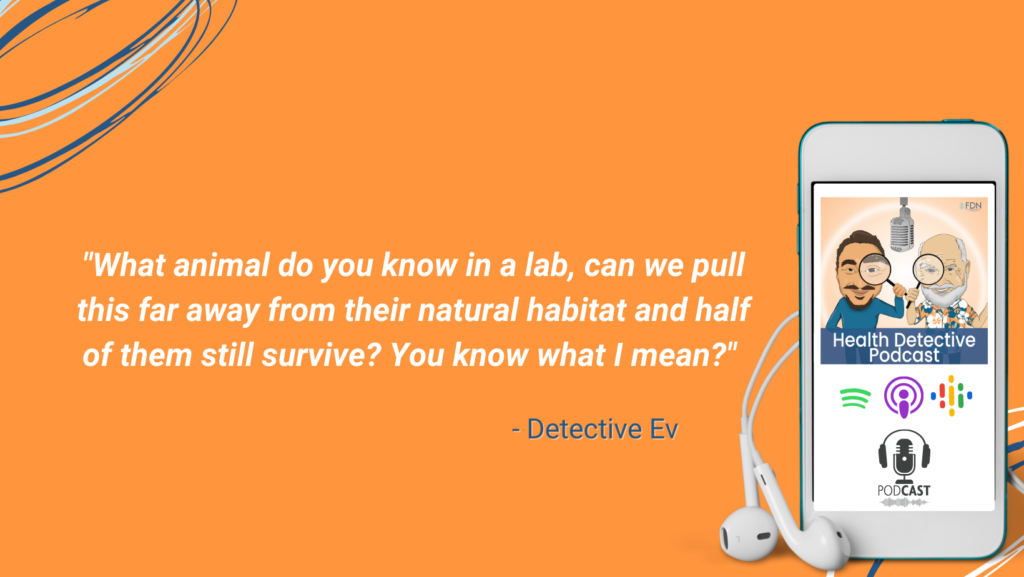
What animal do you know in a lab, can we pull this far away from their natural habitat and half of them still survive? You know what I mean? If you do this even minorly with rats, they’re going to die significantly earlier. We are seeing that. But to me, it’s actually sometimes amazing how much the human body can handle.
You know, my dad (it’s actually his birthday today), but like he does the sunlight thing right, unintentionally, because he’s been a landscaper for the last 30 years. The guy smokes two packs of 100’s cigarettes per day. He eats pizza, drinks soda, but he nailed down the activity, the movement, and the sun thing. I mean, the guy looks like he’s of Latin-American descent, he’s that dark and I’m not even joking. He did that right.
And guess what? I’m not saying I’d recommend going out and smoking two packs of 100’s a day and eating the food that he eats. The guy’s got no health issues that we know of right now. My mom makes him go, he’s healthier than most of us.
Long-Term Stress is Destroying Good Hormones
It’s like, what do you want? Can you imagine what would happen if people actually just did two or three or four of these things correctly? It’s really remarkable to think about, and I love how all those things, just tying it back into the topic. Yes, guys, they can be tied into the hormones because it is stress long-term that is leading to those tanked hormones.

Now stress can mean a million different things, of course. But there’s really no other way unless I’m missing something, like just to keep it simple. Unless you were born with some kind of rare defect, which I don’t think is the case for 99.99% of the clients that you’re dealing with or that we’re dealing with at FDNthrive. It’s just chronic stress in one way or another.
What are some maybe common things that you’re seeing personality wise or lifestyle wise in the people that you work with? I know that you work with a ton of people hormone wise. Are these all Type A people? Are they all staying up late?
What are some common things that you’re just like, guys, you gotta get this in check to get your hormones better if you want to deal with tanked hormones?
Personality Types with Not So Good Hormones
[00:37:00] Jennifer Woodward: Such a good question. Right now, I’m actually running a group program. I’ve got 17 ladies in that group. I put up a poll and said, “I identify as a Type A personality.” I think it was like 87% of those ladies identified as a Type A personality. The two that didn’t are the ones that are doing the best in my program.
The ones who are Type A are the ones that are asking me, well, what’s the science on this? Or how can I be sure that I’ll keep the weight off when I’m done? You know, they’re asking me all these questions because they want to be able to control the situation when there’s no control. You know, you can’t control this. There are things you can do, implementation that you can put in.
I’ll always tell my clients, you’re wanting A plus B equals you know, X at Y and Z. That doesn’t happen. Our bodies are weird. That’s one thing you can rely on, your body is weird. So, A, B, and C, and you might get F. You know, or you might get G and H. That’s okay as long as you’re putting in the effort and you’re being consistent.
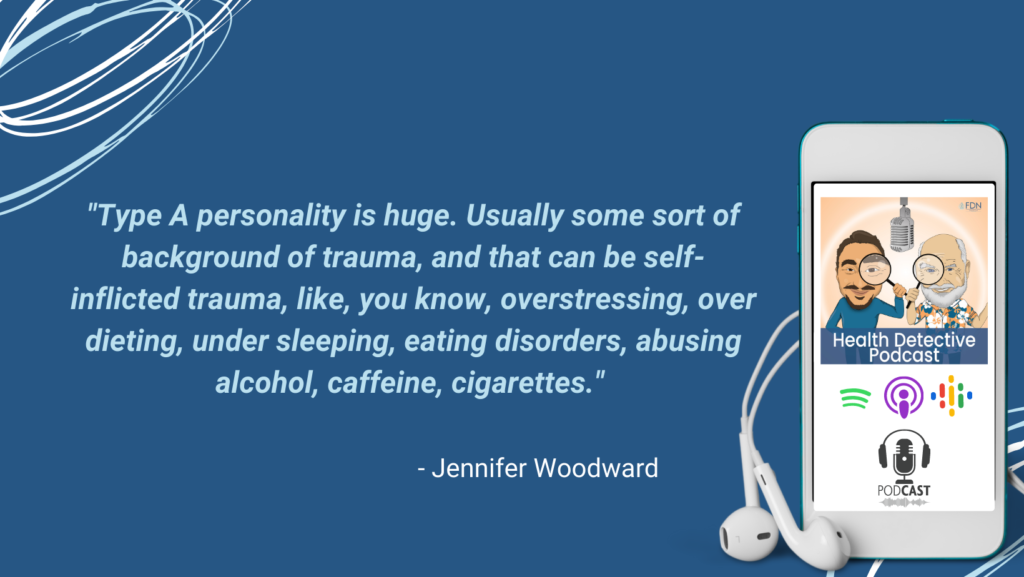
Type A personality is huge. Usually some sort of background of trauma, and that can be self-inflicted trauma, like, you know, overstressing, over dieting, under sleeping, eating disorders, abusing alcohol, caffeine, cigarettes. It can also be more true trauma, sexual abuse, childhood adverse events. That’s generally something that I’ll see because the women I work with usually have at least one autoimmune disease and hormonal insufficiency as well.
Drivers and Pushers Don’t Have Very Good Hormones
Then also that drive. I see this in a lot of my clients, well I can’t take care of myself, I’m taking care of my parents. I’m taking care of my kids. I have this teenager that’s still living at home. I volunteered for another project at work. I am in ministry at my church and I’m homeschooling. Oh, really? How’s that working out for you? Cause you’re here in my office and you look a wreck, sister.
You just can’t do all of those things thinking that number one, eventually you’ll get a break, or number two, you’re going to be rewarded for all your hard work because you’re not. You know, the more you give, the more people will take advantage of you. When really you can do a better job for everyone else if you are taken care of.

If you’re nourished, if you’re happy, if you’re well adjusted, think of how much better of a mom you’ll be, or a wife, or a husband. Think of how much better of an employer or an employee you’ll be, or a homeschooling maven. Whatever it is, you’ll do better if you yourself feel good first. That’s something that I see a lot of in my clients, is they’re drivers and pushers.
And on that note, before you let me go, I did want to address those two particular deficiencies of estrogen deficiency and then progesterone deficiency. Those are a result of us pushing ourselves too hard, for sure.
Fitting Things in Every Second of Every Day
[00:39:33] Detective Ev: I feel like I’m always going through a transitional phase. I try to do that, but it’s a transitional phase that happens to be relevant to this because I’m listening to Tim Ferriss’s book right now, The 4-Hour Work Week. I know it’s kind of older and I mean, especially someone like me, I feel like people just assume that I would’ve listened to it. I hadn’t gotten to it yet. So, I’m listening to it right now.
It’s kind of amazing how there’s 15, 16 hours in the day, yet I always have to do something for 15, 16 hours. But I can find my eight hours of sleep because that’s my personal non-negotiable. It’s like, I really need to be doing 15, 16 hours? Things only work out when I do 15, 16 hours and fit something in every second of that day.
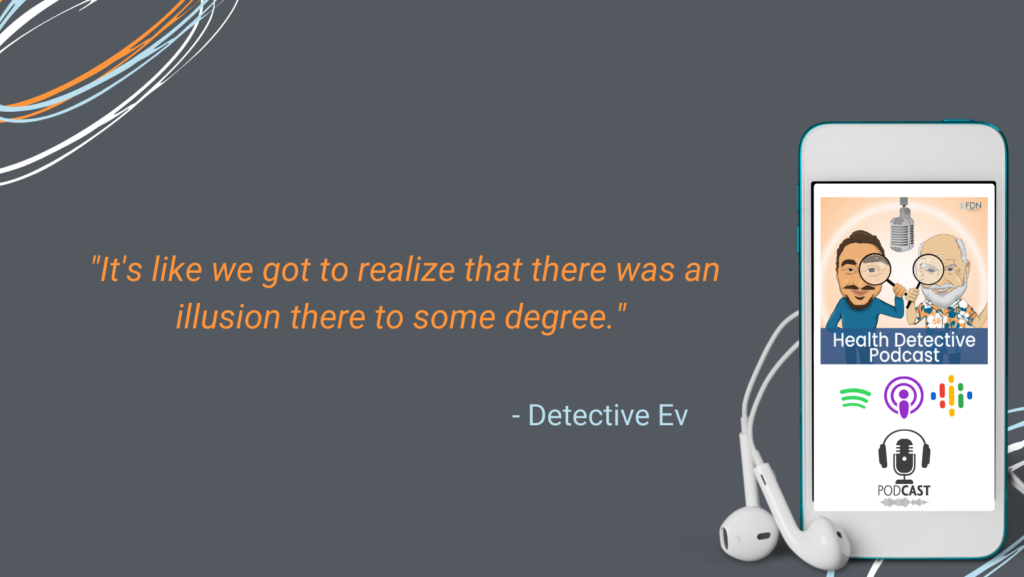
I know that’s not true, but it feels like that sometimes. I think that’s where people fall into these traps. It’s like, no, I have to be doing something every single second of every day. That’s just my question. It’s like, how lucky are you that it just so happened to work out that every single second of your day is the exact amount of time that you needed to get everything done? It’s like we got to realize that there was an illusion there to some degree.
The person I was just interviewing today before you, she was talking more about emotional eating and stuff and how you people get super busy and it’s to run from their emotions. I’m not saying everyone does it for that reason. I probably do that for that reason sometimes. Sometimes I probably don’t.
Constantly Busy Societies Effecting Good Hormones
Maybe it’s just out of habit. You could be feeling great and just doing that cause that’s what you normally do. But I go so back and forth because I love the game. I don’t mean this in like you know, someone’s gonna talk crap about this. I do like the capitalistic game to some degree. I think it’s cool that someone can have very little money and then work their way up. It’s not a perfect system, but I think it’s cool that the opportunity is even there to do something like that. But I just wonder? Because I have this deep spiritual side to it.
I’m just like, dude, I believe that I’m this soul like renting this meat suit more or less temporarily, and it’s like, and you’re chasing this for what?
[00:41:12] Jennifer Woodward: What happens after?
Detective Ev: What does this do? Right?
Jennifer Woodward: What happens next?
[00:41:14] Detective Ev: Then you still got to play by the rules of society. Right?
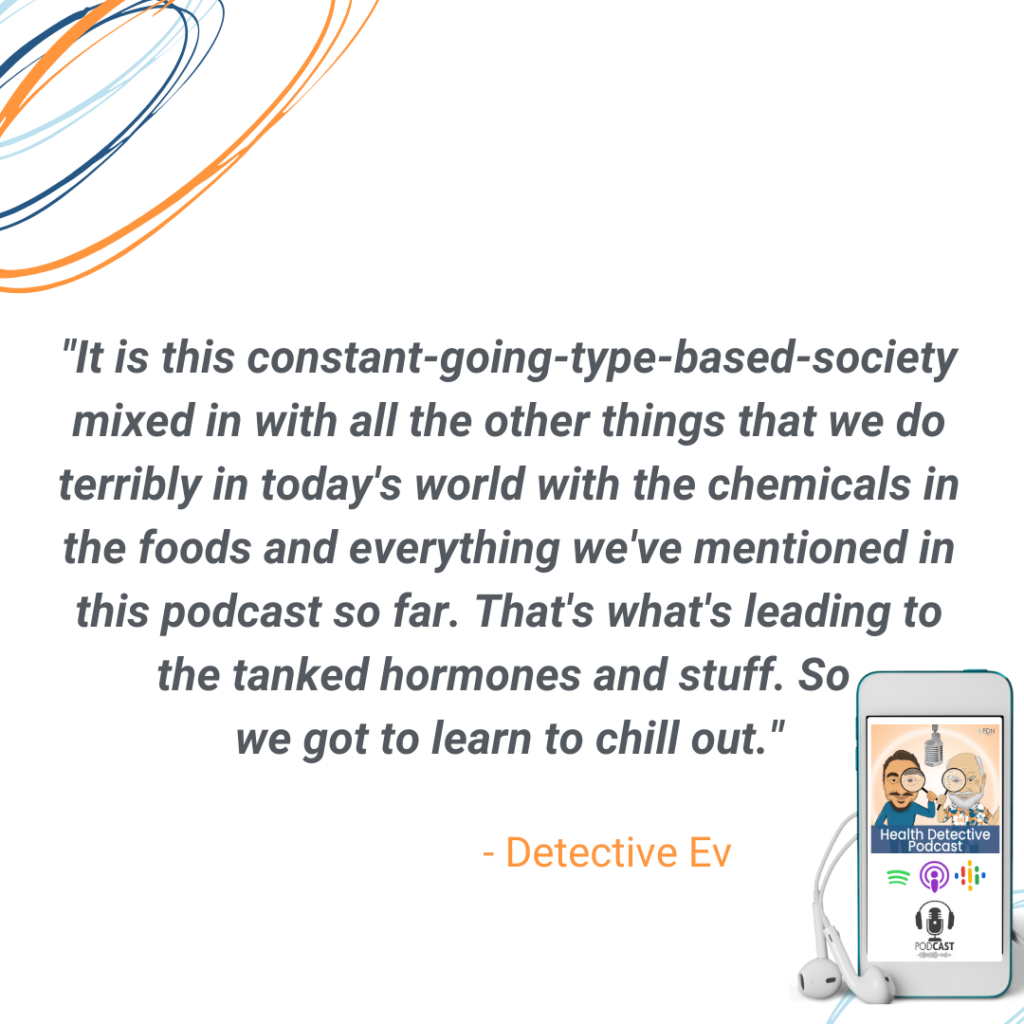
I can’t just give it all up. Then I’d be homeless and that might not be advantageous either. There’s a line to be drawn, but I know the extremes on either end don’t seem to really be good. I hope this doesn’t seem irrelevant to people. This is very relevant to the conversation about the hormones and stuff. Because it is this constant-going-type-based-society mixed in with all the other things that we do terribly in today’s world with the chemicals in the foods and everything we’ve mentioned in this podcast so far. That’s what’s leading to the tanked hormones and stuff. So we got to learn to chill out.
Setting a New Foundation for Good Hormones
The cool thing is you can kind of trade off. I work a lot, but I’m very strict with my other things. That helps me maintain my hormones. I know that just because I test often or whatever.
But if I wanted to work a lot, and wanted to be a normal 26-year-old, go out to the bars on the weekends and stay up really late two nights out of the week, one meal seven days a week. That probably wouldn’t work for me personally, just with my health history. So, I think we can kind of find a balance.
Maybe you don’t want to give up certain things and that’s fine. But at the end of the day, if you’re at a point where you’re asking a question about tanked hormones, I know from personal experience, you know from personal experience, at some point you just got to accept that less is more and you gotta chill out.
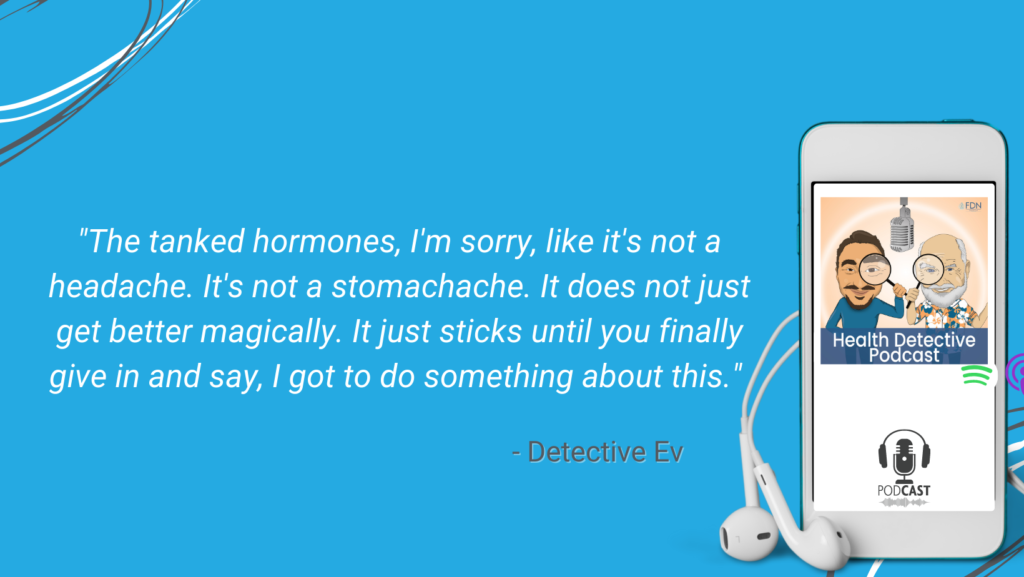
The tanked hormones, I’m sorry, like it’s not a headache. It’s not a stomachache. It does not just get better magically. It just sticks until you finally give in and say, I got to do something about this. That’s probably been your experience I’m assuming too, and probably with clients.
[00:42:32] Jennifer Woodward: A hundred percent. Yeah. You have to start over; you have to reground yourself.

It’s not something that you can work backwards from. You have to completely set a new foundation. I think that’s what’s so hard for people who are used to getting a pill for every ill, myself included.
You guys know my background was in pharmaceuticals. Like, I have a pill for you right here. We can fix that.
Focus on Good Hormones, Good Health
But I realized that’s not actually the case and it takes a long time. I just got a comment from one of my clients who was sharing with the rest of our group, but it took her eight months. Because people always want to know this, well, how long is it gonna take? And I’m like, well, it takes a dog’s nervous system six months to reset itself from trauma. Dog with no higher brain function, no soul, right?
But a human, especially a human woman or a human intuitive, you know, like yourself, Ev, who is thinking deeper and having more of an emotional response to things, it’s going to take a lot longer than six months for this particular woman to reset her HPA axis dysfunction doing all the things that we’ve talked about today and more. It took her eight months and she’s still a work in progress. It can take a long time.
But when you think about putting effort into that, or putting effort into getting a new car, getting another house, or a beach house, or whatever it is that you’re searching after, that Ev and I know is not going to fulfill any of us. It’s just, once you get that, it’s going to be the next thing. And after that, it’s just going to be the next thing.
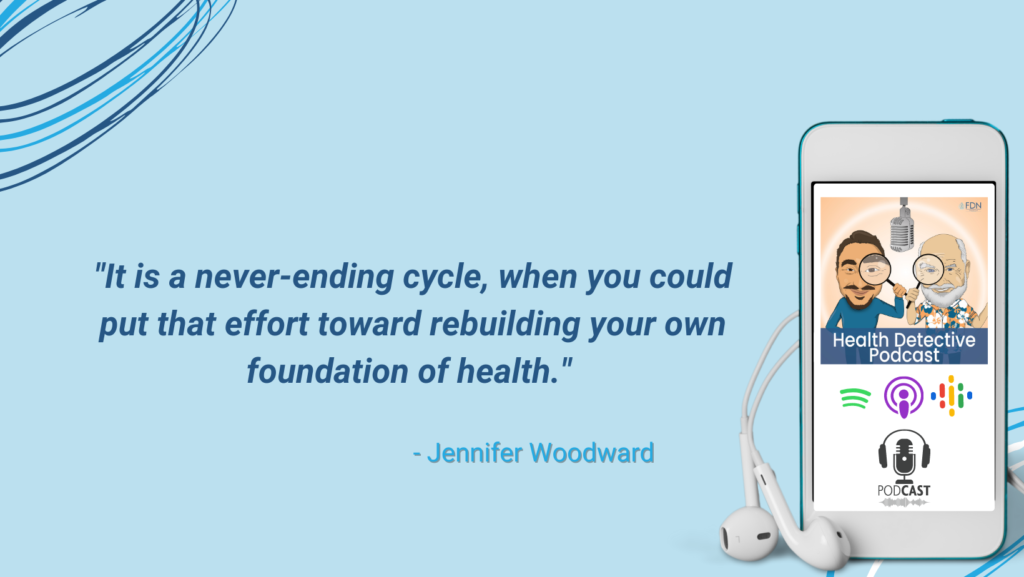
It is a never-ending cycle, when you could put that effort toward rebuilding your own foundation of health. Pushing out and teaching your family and your friends, your coworkers, like, Hey Ev, do you want to do our podcasts while we’re like walking or sitting outside? You know?
You Have Time to Schedule for Good Hormones
I’ll have people, I can’t do that. I work all day every day. Well, can you take a meeting outside? You know? Well, I homeschool all day every day. Okay. Can you take your kids to the park to play, you know, for an hour? Yeah, you can because you are the only one in charge of your schedule.
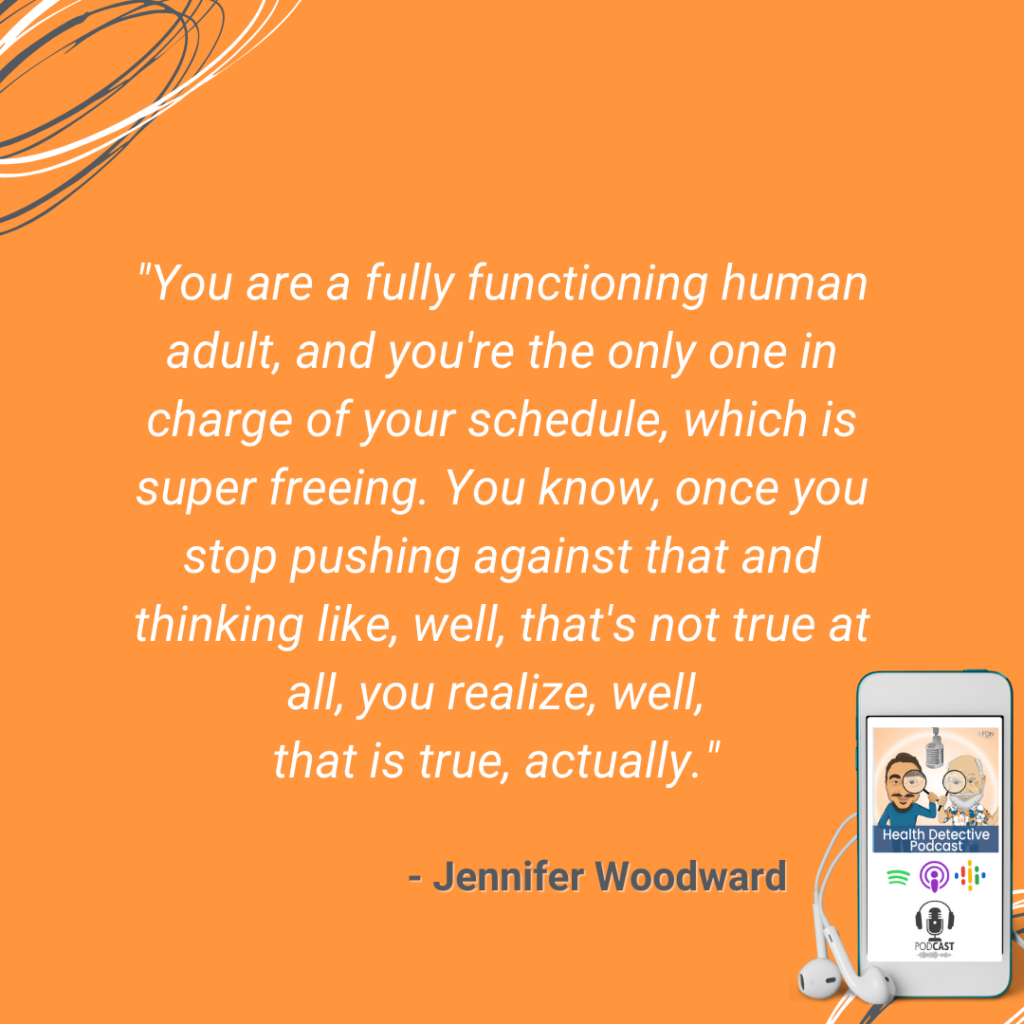
Your mate is not in charge of your schedule. Your boss is not in charge of your schedule. Your mom is not in charge of your schedule. You are a fully functioning human adult, and you’re the only one in charge of your schedule, which is super freeing. You know, once you stop pushing against that and thinking like, well, that’s not true at all, you realize, well, that is true, actually.
And I do have an hour to go blow bubbles and take a walk. I do.
[00:44:42] Detective Ev: Oh yeah. It’s humbling too, because I keep thinking about that more and more when I’m like, oh my God, there’s so much on the schedule. I’m like you did this. You chose that. No one said the scheduler has to open up at 8:00 AM and close at 9:00 PM. You did that. It’s like, oh crap. One of those moments where you realize you’re actually responsible for your life. You know what a concept?
Before we wrap up here, not to jump around, but I think I’d like to talk about a little more in depth with the estrogen and progesterone thing before we hop off. I know, especially the women that listen to the podcast, they are more educated on this stuff. They do read about this stuff in depth. So, I’m kind of curious, I don’t even have necessarily a specific question.
Estrogen Dominance, Progesterone Deficiency
Is there anything that you wish people knew a little bit more about those two hormones? Cause I feel like there’s pills handed out left and right, and creams handed out left and right to boost those two things. And is that really the answer?
[00:45:29] Jennifer Woodward: I love that question. I think for those of you who are listening today, you already know the answer to that question is no. Those things aren’t the answer. But that doesn’t mean that we don’t have a ton of insufficiencies with hormones and that you can do something about it in the meantime while you’re working on all those other things.
The number one deficiency I see in women is progesterone. That is women aged 15 to 55, right? Even if you’re post-menopausal, you’re still of course going to be depleted in progesterone. That’s because so many things conspire against us to relieve us of our progesterone stores.
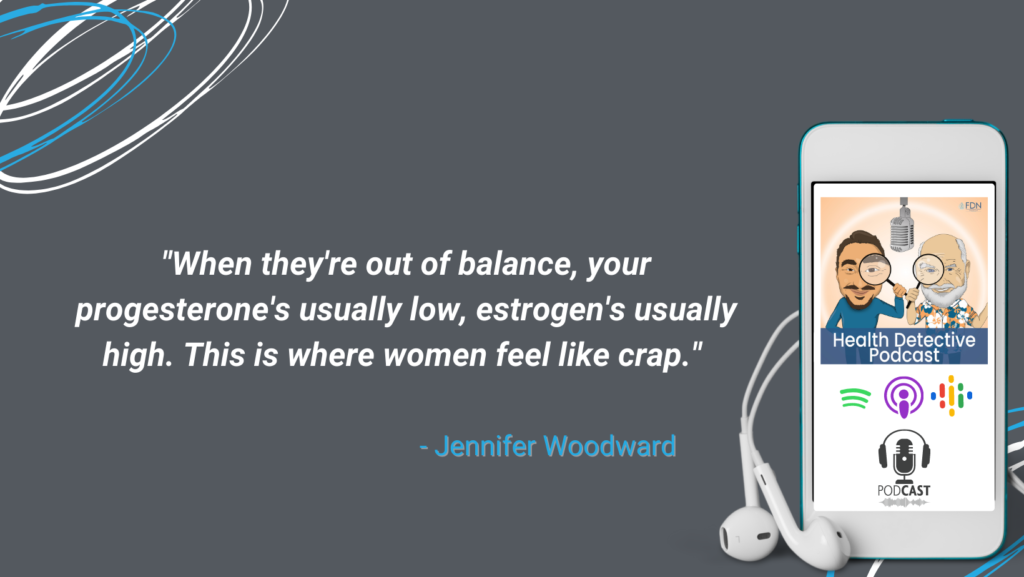
Then so many of us are estrogen dominant at the same time. You need to have those two hormones in balance. When they’re out of balance, your progesterone’s usually low, estrogen’s usually high. This is where women feel like crap. This is where your periods are crap, right? Your sleep, your energy, your mood, your weight, your hair, skin, nails, libido. All of it goes to crap because that estrogen and progesterone balance is off.
So, things that increase estrogen in the environment. There’s a fantastic book. It’s not written for most lay people, but it’s so interesting. It’s called Estrogeneration by Anthony Jay.
Deficiencies in Precursors to Progesterone
It is such a fascinating resource to find out where all the estrogen hides. Some of it’s actually hiding as in like our food sources, like atrazine and these crazy chemicals that are in so many of our foods. But then also places that most of us know, like BPA, and BPS, and all of these estrogenic containing chemicals that we have in our personal care products and whatnot. We’re exposed to that all the time.
Then stress depletes our progesterone. Cortisol is synthesized from progesterone. So, if you don’t have enough progesterone, you’re not going to make enough cortisol. If you’re under stress all the time, your body’s taking that progesterone. It’s just using the progesterone as food, basically for your cortisol store.
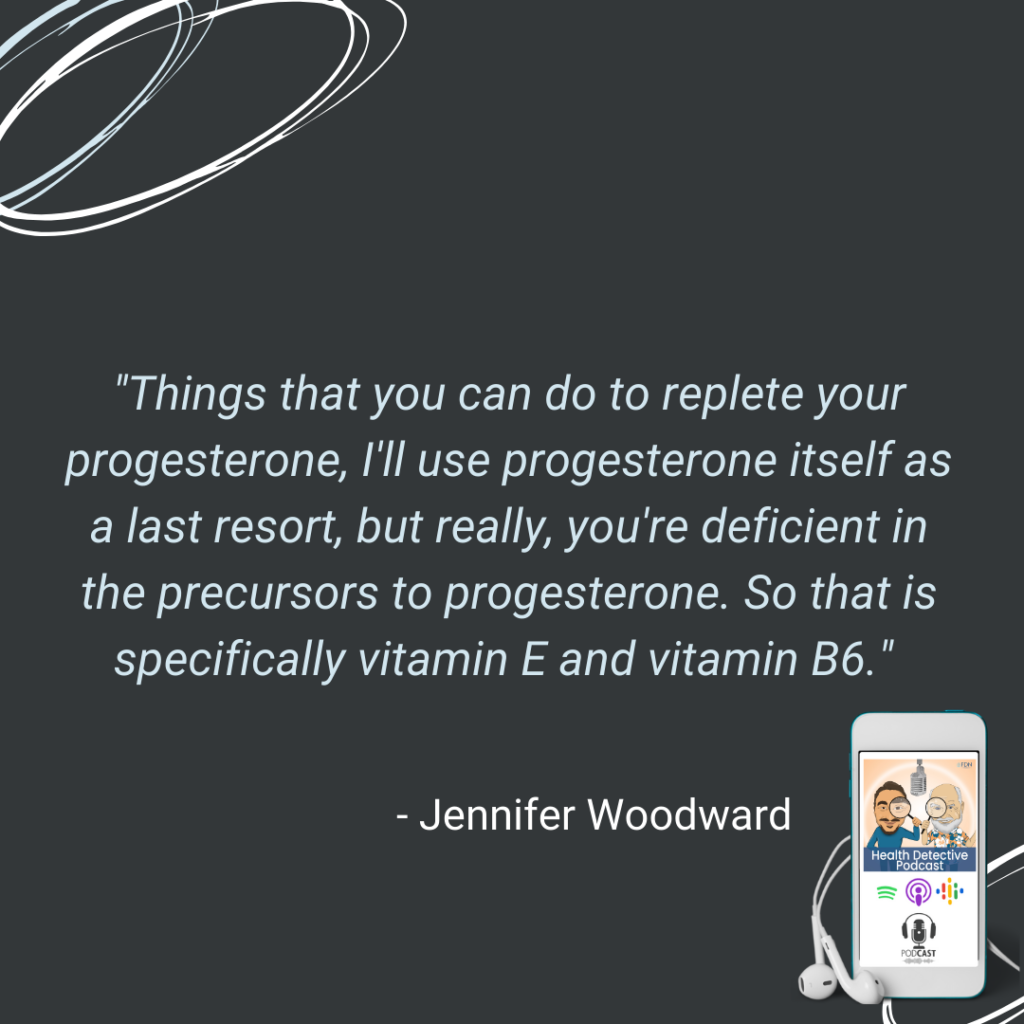
If your cortisol’s high, or if your cortisol’s low, you know that your progesterone is going to be affected. Things that you can do to replete your progesterone, I’ll use progesterone itself as a last resort, but really, you’re deficient in the precursors to progesterone. So that is specifically vitamin E and vitamin B6.
I love Tocotrienols. There’s alpha tocopherol that’s not a great form of vitamin E. You want tocotrienols, which you can find on Amazon, you can find at a health food store. It’s about $30 for 60 pills. And you want to take at least 400 IUs of vitamin E every day.
If you’re deficient in progesterone. You can get those from nuts and seeds as well, a little bit more bioavailable. But most people are so deficient in vitamin E that they need those higher doses of essential fatty acids in supplement form.
Functional Foods to Help Pull out Extra Estrogen
B6 is another huge player. If you can’t sleep, if you’re super stressed out, if you’re a “b-word” all the time, you probably are deficient in B6. Think of that, B6, B-word, right? You are going to want at least 50 milligrams of B6 and take that at night. It helps you sleep. It’s a precursor to allopregnanolone in the brain, which is a precursor to progesterone. It chills you out. It calms you down. Remember that progesterone is your chill, relaxing hormone.
If that’s the opposite of how you feel, you’re probably deficient in progesterone. You can do a salivary cortisol panel through Fluids IQ and definitely find out whether or not you’re truly deficient, but for the most part you probably are.
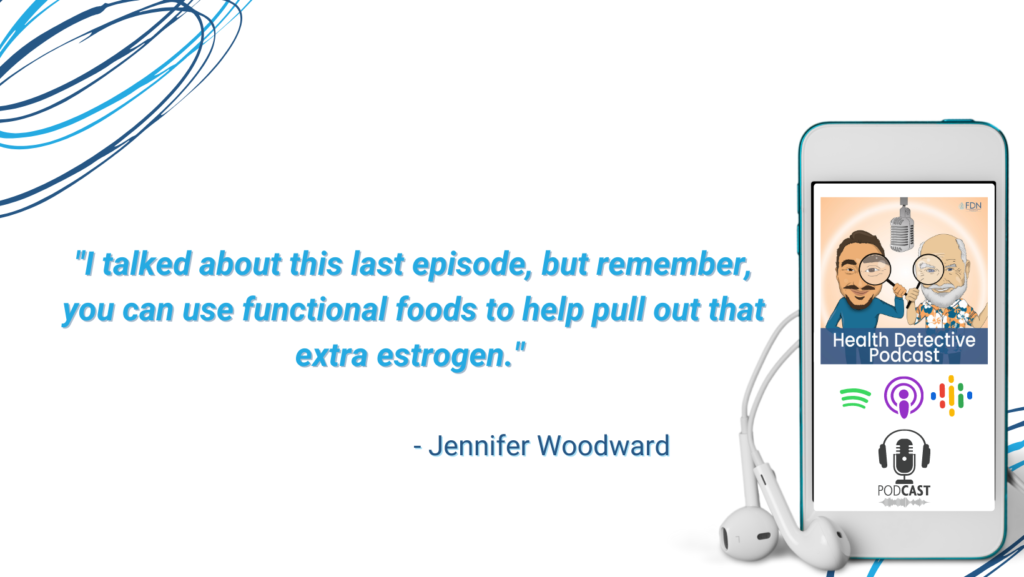
Then remember that your estrogen is high as well. I talked about this last episode, but remember, you can use functional foods to help pull out that extra estrogen. Top three foods: flax, ground flaxseed will pull out extra estrogen. Carrots, raw carrots. I love, love, love raw carrots to pull out excess estrogen. Binds it in the gut and helps you excrete it.
The raw carrot salad is fantastic. That’s just grated carrots, a little bit of coconut oil, and salt as per Dr. Ray Pete, to help pull out that excess estrogen.
My third favorite functional food is actually prunes. Most women, if you have estrogen dominance are a little bit slow in the motility section. You’re not pooping as often as you should, and that’s the only way your body can actually get rid of that toxic estradiol, getting it out through the bowel. Prunes can definitely help with that. They’ve also got some great phytochemicals that are going to be immune boosters at the same time.
The Signature Question
Those are things you could do. More nuts and seeds, more flax, more prunes or carrots. And look at that. We’ve got a great, really ancestral, really low-cost way to start balancing hormones with food.
[00:49:39] Detective Ev: Bam. You know so much cool random crap every time we talk.
Amazingly, I think we’re almost at our 40-minute mark here. Not that there’s a limit, but it’s always fun talking to you. I know as simple as this might’ve seemed; people love these types of talks on our show where it’s just like more conversational. Then we have some really great tidbits thrown in. And probably the end here was one of the best little bits.
It’s so cool. Now, I want to do this because I don’t know what your answer was last time. And it’s totally cool if it’s shifted, that’s fine. But you might remember that we have a signature question on this podcast. And that signature question is if we were to give in this case, Jennifer Woodward, a magic wand, and you could get every single person in this world to do one thing for their health or not do one thing.
What’s the one thing you’d get them to do. And I’ll compare it to your last answer.
Jennifer’s Answer

[00:50:23] Jennifer Woodward: I’m pretty sure last time I told everybody to eat more meat. I’m still going to stick with that. It’s always my foundation. But my number two thing would be, go find your inner child.
Go find your leisure time. Go find the thing that transports you. Then don’t make excuses because we’re not promised our next breath, go do it. Go do that. I will never forget one of my clients telling me, I just want to sit out in the backyard and blow bubbles from a 99-cent store bubble wand. I love that.
Go find something that makes you feel like a kid, cause you don’t get this time back. You are in charge of your schedule. So you are in charge of your leisure time.
Try the FDN Course for FREE
[00:50:59] Detective Ev: Excellent. Thanks so much for coming on my friend.
Jennifer Woodward: Thanks, Ev. Good to see you.
Okay folks, that’ll wrap it up for today’s interview with Jennifer Woodward, executive director of AFDNP, which you will become quite familiar with if you ended up going through the FDN course and graduating.
Obviously, if you want to try the FDN course, you heard this in the middle there, but you can now go to fdntraining.com/tryfdn that’s fdntraining.com/tryfdn. We literally let you try the whole first module completely for free, no credit card needed, nothing like that.
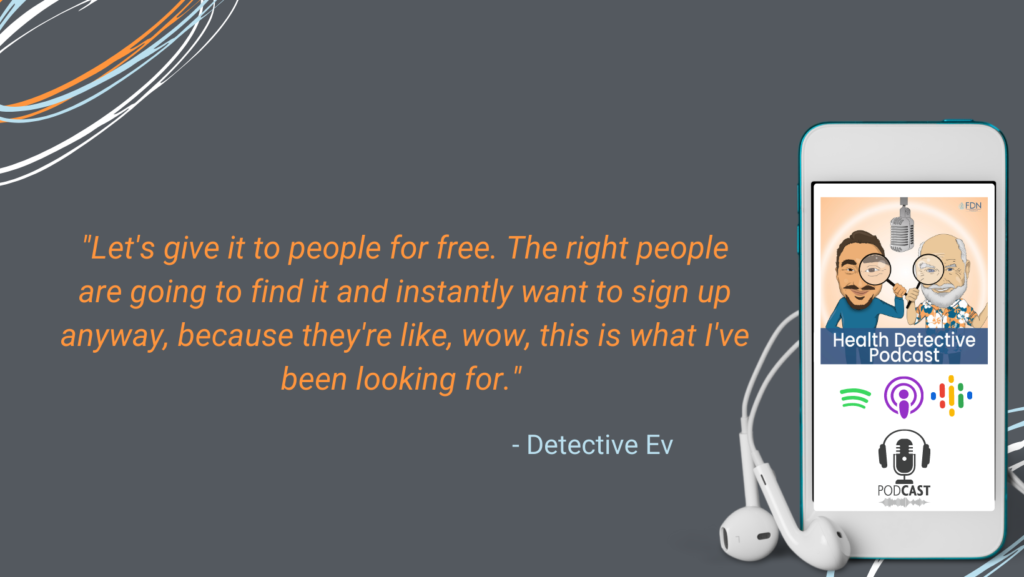
Our philosophy, and I will repeat this endlessly. We know for a fact, there are many people out there that want to do this work and that need this course. We do not have to use sales gimmicks, or cheesy marketing to get you involved then. Let’s give it to people for free. The right people are going to find it and instantly want to sign up anyway, because they’re like, wow, this is what I’ve been looking for.
That’s the exact experience that happened to me five years ago. Other people are going to say, well, hey, this isn’t for me. Now there’s no harm, no foul. We didn’t take any money. You got to try it out. We didn’t give away the secret sauce. We only gave you part of it. Everyone wins.
Conclusion
With that said, if you guys do enjoy this content, we would really greatly appreciate it if you would leave us a five-star review on Apple Podcasts and/or Spotify.
I am on a personal mission to get us to a hundred five-star ratings on Apple without one negative one. I think we have a great community; I think we can do that. I’ve never seen that on any podcast. As of recording this, we are at around 55 or 56. You guys are absolutely wonderful. I can’t tell you how much I appreciate that. It helps me as a host. I need to know if I’m doing a good job. I need to know where I need to improve.
So far, it seems like you guys are really liking the content. If you want to leave something for me and how we can better this show without leaving a negative review, you actually could also go to our Podbean. Search for the Health Detective Podcast, Podbean. That’s a separate website, where we upload our podcast. There you have the ability to leave us comments, questions, or episode requests.
Anyone that has left a comment there will tell you that I always get back. I find the right person for their request, and I throw them on the show. Since we have the ability to release two-hour long episodes per week, we always can find something fun to throw into the mix. We can always honor the people who are wanting something specific. We might not be able to do it next week, but at the very least we can usually get you in the next couple of months.
I will stop talking for today. Thank you again for listening and we hope you guys have a great weekend.

